#their character development arcs are finding themselves
Text
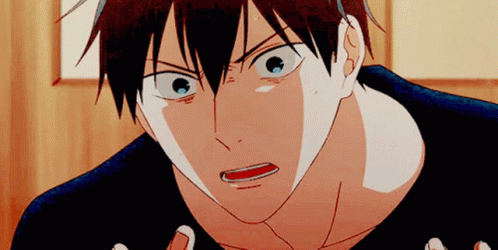
Happy birthday ritsuka uenoyama the entirety of given DOSENT DESERVE U AT ALL
#the narrative the characters the fandom and kizu should be ashamed of themselves ngl#the way you gave your VERY ALL to save mafuyu at his darkest being there at his lowest helping him to find light again#even if you think you are no better than the other even when you dont know his whole story even if you feel no better than his first#you still gave your very best for him by finishing his deceased lover's song and sang it for him#only for your character arc your development your issues insecurities and trauma to be ignored shunned and discredited#your lover was your first but you knew you weren't his first#you knew he loved someone way before you and now that he's gone your lover still clutched on to the past#but you helped him moved on from the darkness and give him the light through music#you ended up filling the void he left for your lover and everyone else only for you to become a shadow of him#the fact that you a main character is constantly set aside and had no character arc whatsoever just to make way for a deceased lover#you are often demonized and hated and told that his lover and his previous lover should've been together and he would choose him over you#and when you asked him one thing he then ignored you and you tired to reach out to him only for them to blame you as you are the problem#seeing you often makes me sad because you did SO MUCH of the story and the narrative would just trash you out#but when someone calls out that you deserved better the same people will stake them saying that you dont undertand the narrative at all#if they cant appreciate your efforts just because you are not him then i would#if you were my oc i would give u the amount of love they never gave#if you were my oc i would develop and expand your character arc so that i would know you better and your ambitions#if you were my oc i would make sure you would be as loved as everyone else#and if you were my oc i would create someone to love you understand your troubles and appreciate you efforts way more than your lover could#the fandom may love a previous lover he loved but you ritsuka uenoyama shall be mine#dont mind the corny ass tags i just feel like it lmfao#uenoyama deserves better#uenoyama ritsuka#ritsuka uenoyama#given#given manga#given anime#bl animanga
12 notes
·
View notes
Text
i don’t get people that get so mad over nina as if she’s not just some bitch that appears for half on an arc ahdhjah
#txt#EDIT: this was also in the drafts#i like luca and her integrity and unrelenting decision to do good. like shes cool and i was happy when we saw her in falconia later on.#but idk. she’s. boring w/o some to play off of her and viceversa. shes ridiculously level headed and good willing to points i find sort of#detached haha. i dont think those are bad as character traits in it of themselves! theyre partly my subjective opinion#but i hope everyone in the room is aware that her and nina's function is to be extremes and exemplify the arc's moral conflict#both as foils BELONG in that arc. their personal struggles. lessons or wtv arent made for characters thatll get 100chs of development yk?😭#and it seems that ninas cowardice is the thing that raises ppl (fair. it's not that i like. liker her as a person precisely ahdgs)#but like thatss their jooob omg ahdhsj
0 notes
Text

"If you don't romance characters in Dragon Age: The Veilguard, they'll find other partners for themselves
"Some characters may be a little more steamy..."
---
"Dragon Age: The Veilguard features a far more fleshed out romance and relationship system than in previous BioWare games, the developer has told Eurogamer - including the ability for party members to go off and find their own love interests, should you not be interested yourself.
Speaking to Eurogamer's deputy editor Chris Tapsell at an event in LA this week, The Veilguard's creative director John Epler revealed more of the game's relationship system.
"In Dragon Age games, BioWare games, romance is a core part," Epler said. "We wanted to give each character their own flavour, or their own style, of romance. So some characters may be a little more steamy while some characters maybe a little bit more innocent. But for each one, you can build these relationships.
"And what's interesting in this game is, if you don't romance characters, they may decide to find their own romances for themselves, whether within the team or within the world itself."
It's reminiscent somewhat of how Shepard could walk in on Garrus and Tali locked in a kiss towards the end of Mass Effect 3 - but only if you had chosen not to show romantic interest in either one beforehand.
What sounds like another improvement from previous BioWare games is how a character's romance arc will be better woven into their own personal story arc, and their involvement with The Veilguard's core questline. BioWare has also worked to ensure that getting to know your characters as friends feels just as satisfying - and that just because you're not banging your buddy, their (platonic) relationship with you will still continue.
"One of the things we tried to do with The Veilguard is it's not just romantic relationship building," Epler continued. "You need to get to know a person before you can really build that kind of relationship with them, and if you choose not to build a [romantic] relationship, we never want to feel like you're being cut off. There's no 'okay, well, their arc isn't progressing, I'm done'.
"We want to make sure the non-romantic relationships are deep as well, with friendships not just for companions and yourself, but also between companions across the party."
For much more on Dragon Age: The Veilguard, be sure to read Eurogamer's full preview of the game's opening hour, as well as much more from Epler on lessons learned for BioWare's present - and future."
[source]
#dragon age: the veilguard#dragon age: dreadwolf#dragon age 4#the dread wolf rises#da4#dragon age#bioware#video games#long post#longpost#mj best of#pls remember that if you follow me you should be 18+ ^^#garrus vakarian#best boy#mass effect
1K notes
·
View notes
Text
TGCF reread new finds #1
Xie Lian actively and consciously knows that he is attracted to HC the MOMENT THEY MEET in the Ox Cart. Like it’s not just blank gay panic, he knows.
His beauty was deadly like a sword, sharp and mesmerising. Xie Lian only met his eyes for a moment, then lowered his eyes in defeat.
MATE, normally wouldn’t you continue to be mesmerised and can’t peel your eyes away? That is, UNLESS YOURE WHIPPED. XL knows that SL's looks affect him to this degree. Defeat is the key word here.
Also
The distance between them had closed too fast. he suddenly didn't know what to do[...]Xie Lian blanked on the spot. He watched as the tall and slender youth walked away with his giant bag of junk as if it were the most natural thing in the world to do, and it made him mutter inwardly, Forgive my sins.
Making a rich young lad carry your things? Making him sleep in your crappy temple? That doesn't warrant the weighty thought? FORGIVE WHAT SINS Xie Lian??!!!
Many village girls saw (HC) and blushed [...] Xie Lian didn't know what they were going to ask, but felt instinctively that it must be stopped at once, and cried, "No!"
Jealous jealous boi! XL WAS POSSESSIVE after ONE night spent together at Puqi Shrine. Didn’t XL just say to SL that he will have no problem in the love department because girls will throw themselves at him? Yo, why are you cock-blocking? Everyone says HC is insane, no XL is equally insane for the other!
Also, when HC revealed that it's his real skin after the Banyue arc, XL instinctively poked him. Then
He looked at his own finger then hid it away, betraying nothing of his thoughts.
What thoughts XL ?!! Explain yourself right now!
Jumping back to OX CART scene, Xie Lian's character development was foreshadowed when they were talking about the gifting of ghost ashes.
Book 1: Xie Lian sighed. "It certainly is painful to think about, to have given everything for love and lose everything in return."
This is what Xie Lian is most afraid of! Like even thinking back to Xie Lian pushing Feng Xin away in Book 4, he definitely operated under that mindset. Love is a risk, it's something to be feared. Even now 800+ years later, he still feels that way and doesn't allow himself to get close to anyone. It just hits so much harder thinking that he operated under that for so many centuries.
Then Hua Cheng says
"What there to be afraid of? If it were me, I'd have no regrets giving away my ashes"
Which I think really changed the way that Xie Lian thought about love. Book 5 Xie Lian completely operates with Love is empowering and isn't something to be afraid of.
TGCF isn't about XL realising his feelings, literally from Book 1 it's about him wondering if it's worthwhile to act on them.
Three things, is this person worth losing cultivation over for?
He needs the reassurance that this person must reciprocate his feelings.
Then HC changed his perspective on love from FEAR -> EMPOWERMENT.
XL is soooo self-aware (unlike SQQ from SVSSS and WWX from MDZS), he's an unreliable narrator in the way that he doesn't reveal everything to the reader, especially his own feelings until he was absolutely sure that there really was both a physical and romantic attraction. I wanted to make this post to dispel the assumption for XL it was easy to forego 800+ years of cultivation. It was not? He ABSOLUTELY thought about it carefully.
#honestly without the thousand caves reveal these two gays would still be 👉👈🥺 at each other#I was inspired by grimbravado's tumblr#tgcf#mxtx#heaven official's blessing#also these are my own perspectives#take it with a grain of salt#hualian#hua cheng#tian guan ci fu#xie lian#feng xin#fenglian#TGCF meta
829 notes
·
View notes
Text
What No One Tells you about Writing #3
Opening this up to writing as a whole, because it turns out I have a lot more to say!
Part 1
Part 2
1. You don’t fall in love with your characters immediately
But when you do, it’s a hit of serotonin like no other. I’d been writing a tight cast of characters for my sci-fi series since 2016 and switched over in a bout of writer’s block this year to my new fantasy book. I made it about ⅓ through writing the book going through the motions, unable to visualize what these new characters look like, sound like, or would behave like without a ‘camera’ on them.
Then, all of a sudden, I opened my document to keep on chugging with the first draft, and it clicked. They were no longer faceless elements of my plot, they were my characters and I was excited to see what they could accomplish, rooting for them to succeed. Sometimes, it takes a while, but it does come.
2. Sometimes a smaller edit is better than a massive rewrite
Unless you’re changing the trajectory of your entire plot, or a character’s arc really is unrecoverable, sometimes even a single line of dialogue, a single paragraph of introspection, or a quick exchange between two characters can change everything. If something isn’t working, or your beta readers consistently aren’t jiving with a character you yourself love, try taking a step back, looking at who they are as a person, and boil down what your feedback is telling you and it might demand a simpler fix than you expect.
Tiny details inserted at the right moment can move mountains. Fan theories stand on the backs of these minutiae. One sentence can turn a platonic relationship romantic. One sentence can unravel a fair and just argument. One sentence can fill or open a massive plot hole.
3. Outline? What outline?
Not every book demands weeks upon weeks of prep and worldbuilding. I would argue that jumping right in with only a vague direction in mind gives you a massive advantage: You can’t infodump research you haven’t done. Exposition is forced to come as the plot demands it, because you haven’t designed it yet.
Not every story is simple and straightforward, but even penning the first draft with your vague plan, *then* going back and adding in deeper worldbuilding elements, more thematic details, richer character development, can get you over the writer’s block hurdle and make it far less intimidating to just shut up and write the book.
4. It’s okay to let your characters take the wheel
I’ve seen writing advice that chastises authors who let their characters run wild, off the plan the story has for them. Yeah, doing this can harm your pacing and muddy a strong and consistent arc, but refusing to leave the box of your outline greatly limits your creativity. I do this particularly when writing romantic relationships (and end up like Captain Crunch going Oops! All Gays!).
Did I plan for these two to get together? No, it just happened organically as I wrote them talking, getting closer, getting to know each other better in the circumstances they find themselves in. Was this character meant to be gay? Well, he wasn’t meant to be straight, but you know what, he’d work really well with this other boy over here. None of that would have happened if I was bound and determined to follow my original plan, because my original plan didn’t account for how the story that I want to tell evolves. You aren’t clairvoyant—it’s okay if it didn’t end up where you thought it would.
5. Fight. Scenes. Suck.
Which is crazy because I love fantasy and sci-fi, the actiony-est genres. Some authors love battle scenes and fistfights. It comes naturally to them and I will forever be jealous. I hate fight scenes. I hate blocking and choreographing them. I hate how it doesn’t read like I’m watching a movie. I hate how it could take me hours to write a scene I can read in 5 minutes. I hate that there’s no way around it except to just not write them, or put in the elbow grease and practice.
Whatever your writing kryptonite is, don’t be too hard on yourself. It won’t ever replicate the movie in your head, but our audience isn’t privy to that movie and will be none the wiser of how this didn’t fit your expectations, because it’s probably awesome on its own. It could be a fight scene, sex scene, epic battle, cavalry charge, courtroom argument, car chase—whatever. Be patient, and kind to yourself and it will all come together.
6. Write the scenes you want to write first
And then be prepared to never use them. It can be mighty difficult working backwards from a climax and figuring out how to write the story around it, but if you’re sitting at your laptop staring at your cursor and watching it blink, stuck on a tedious moment that’s necessary but frustrating, go write something exciting. Even if that amazing scene ends up no longer working in the book your story becomes, you still get practice by writing it. Particularly if you hate beginnings or the pressure of a perfect first page is too high, you’re allowed to write any other moment in the book first.
And with that, be prepared to kill your darlings. Not your characters, I mean that one badass line of dialogue living rent free in your head. That epic monologue. That whump scenario for your favorite character. Sometimes it just doesn’t work out anymore, but even if it ends up in the trash, you can always salvage something from it, even if that’s only the knowledge of what not to do in the future.
7. “This is clearly an author insert.” … Yes. It is. Point?
No one likes Mary Sues, because a character who doesn’t struggle or learn to get everything they want in life is uncompelling. The most flagrant author inserts I see aren’t Mary Sues, they’re nerdy, awkward, boring white guys whose world changes to fit their perspective, instead of the other way around—they don’t have anything to say. I’m not the intended audience to relate to these characters and I accept that, but I don’t empathize with the so-called “strong female character” who also doesn’t have flaws or an arc either.
A good author insert? When the author gives their characters pieces of themselves. When the “author insert” struggles and learns and grows and it’s a therapeutic experience just writing these characters thrown into such horrible situations. They feel human when they’re given pieces of a human’s soul. They have real human flaws and idiosyncrasies. I don’t care if the author wrote themselves as the protagonist. I care that this protagonist is entertaining. So if you want to make yourself the hero of your book, go for it! But make sure you look in the mirror and write in your flaws, as much as your strengths.
#writing advice#writing resources#writing tips#writing tools#writing a book#writing#writeblr#fantasy#scifi#what no one tells you about writing
618 notes
·
View notes
Text
[Limbus Company] Faust’s Development (or Lack Thereof) in Intervallo 6.5

So Murder on the WARP Express came out and uh… The suspicions I had regarding Faust’s future arc ended up being confirmed. Faust is definitely not reaching out to the truth. I didn't expect the seeds for her story to be planted so soon, but here we are. It’s real. And you're probably thinking, “Uh… WTF are you talking about?” Let me explain to you what I mean.
The message of Library of Ruina is a critical part to understanding what's going on in Limbus Company. I will tell you straight-up here and now, absolutely nobody in the fanbase knows what the hell LoR is actually about. Nobody. And it is such a shame, because it has such a great message that absolutely nobody talks about. I'd love to tell you much more about it, but that involves long explications on Jungian Psychology, the Jewish Kabbalistic Tree of Life, and the story itself, which I don't wanna subject you to yet (I am saving my esoteric lore dumping for the video scripts I’m currently working on). What I will tell you, however, is that the lessons learned by Angela and Roland in LoR are all about opening oneself to everything that is possible in life. The ways in which they do this are:
(1) To listen to one's inner world, or intuition. Don’t just blindly believe whatever someone else says. Follow your own inner voice.
(2) To listen to one's outer world, or reason. Don't just believe whatever you want to believe. Look at the facts and be receptive to others' opinions.

That's all you need to know for now about this particular subject. The theme of opening oneself to infinite possibilities is one that carries over from LoR to Limbus Company, and it is present in every Sinners' story. Literally all of them were/are limiting themselves in one way or another due to their flawed beliefs. And each of them is on their own journey of self-realization, or in Jungian terms, “individuation.”
The Mirror Worlds also expand on this theme. They provide infinite ways of looking at the same subject, which sounds wondrous and exciting at first, but it really just reflects what's already there. Remember Yi Sang's and Heathcliff's arcs? For Yi Sang, the Mirror reflected his already-existing potential, while for Heathcliff, the Mirror reflected his surrender to a perceived fate. Mirror World Identities may offer additional combat prowess as well as insight into the characters/worldbuilding, but they end up being quite limiting due to their usage (basically “cheating”) and very nature (as "reflections").
Moreover, Goethe's Faust was something that repeatedly showed up in my research on Jungian Psychology. I kept finding Faust's story referenced in articles, academic journals, as well as the book I'm currently reading called Man and His Symbols. This book was written by Carl G. Jung and some of his most trusted followers, and it legitimately explains what Project Moon's mindset was while forming the world and stories of their games (I am not even exaggerating. I have to constantly pause my audiobook and write down notes on what I'd just read because it keeps indirectly revealing PM’s intentions for the series). Anyway, in one of Joseph L. Henderson's chapters named “Heroes and Hero Makers,” he talks about how the archetype of the hero cycle is represented in many stories. An aspect of this archetype essentially revolves around the “hero vs. villain,” or in Jungian terms, the “ego vs. shadow.” The hero must face off against the dragon and triumph. It’s about the development of consciousness through the "ego" (awareness that one exists and has an identity) mastering and assimilating the "shadow" (the parts about ourselves we don’t like or don’t acknowledge deep down). This archetype exemplifies the stage that’s supposed to take place during childhood and adolescence—it’s about growing up. If the hero fails to slay the dragon, i.e. a person fails to assimilate their shadow into their psyche, they become stuck in this state of immaturity. Henderson uses Faust as an example:
“One can see this theme, incidentally, in a well-known literary hero figure—Goethe’s character of Faust. In accepting the wager of Mephistopheles, Faust put himself in the power of a “shadow” figure that Goethe describes as “part of that power which, willing evil, finds the good.” Like the man whose dream I have been discussing, Faust had failed to live out to the full an important part of his early life. He was, accordingly, an unreal or incomplete person who lost himself in a fruitless quest for metaphysical goals that failed to materialize. He was still unwilling to accept life’s challenge to live both the good and the bad” (Man and His Symbols, page 121).
Henderson is saying that Faust is reluctant to face life’s hardships, so he lets his unconscious aspects—his shadow, or Mephistophiles—control what he does because it’s easier for him to live that way. And as a result, he remains this underdeveloped, immature person.
In Limbus, Faust’s shadow is Mephistophiles, the reflection of her inner pride and desire to learn more. The knowledge she gains from the bus, her ability to communicate with her IDs, is incapacitating her ability to develop as a person. She’s using it as a crutch. And her overreliance on this knowledge, ironically, reveals how truly ignorant she is. The literal shadow cast in Faust’s E.G.O is her IDs for these very reasons—she is afraid of not knowing what to do.

Anyway, the reason I brought up LoR’s message and the Mirror Worlds earlier is because it is very, VERY relevant to Faust’s arc. Each of the Sinners need to reach out to all the possibilities of life. To not just blindly follow their own beliefs or the beliefs of others, but to see the truth through their own eyes, unclouded by bias. Through her use of the Mirror Worlds, Faust goes, “Well, I’m already reaching out to all possibilities! I’m following my intuition and using reason!” And she technically is, but it’s paradoxical. She is using intuition and reason… But it’s all through the use of her IDs, which are both “herself” and “not herself” at the same time. So she’s still just blindly following her own beliefs and the beliefs of others; she’s only listening to her own opinions and copying down what others say to her, all at the same time.
I noticed this while rereading key parts of the game again. In Episode 6-25, the Sinners discover the researchers’ experiments below Wuthering Heights. Faust was utterly oblivious as to what their goals were, and Dante commented on how odd her behavior was when she finally started talking.


Later in Episode 6-44, she urges them to find out who informed Erlking Heathcliff about the Mirror Worlds, causing them to pick up on the fact that she doesn’t actually know everything.

In Episode 2 of the 3rd Walpurgis Night, Faust freezes up when asked by Dante to give a more detailed explanation on the Library. She then gives soft confirmation that she is, indeed, in cahoots with her IDs.
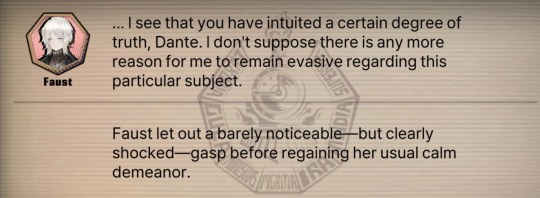

Murder on the WARP Express spilled everything. As a result of being separated from Mephistopheles, she is forced to be without her IDs and must figure things out on by herself. Her complete cluelessness regarding what to do demonstrates her lack of any true life experience. She acts like a newborn baby attempting to walk. However, while she is clueless, she is not helpless. She, in fact, does have the potential to grow if she puts her mind to it. Faust exhibits curiosity, ingenuity, and amiability when she must undergo the trials of the WARP train incident.








She takes interest in the perspectives of the other Sinners when asking for help. She is able to discover new things and problem-solve by herself.

Faust can learn on her own and make friends if she really wanted to.
...Unfortunately, she falls back to her dependency on Mephistopheles at the end of the story and closes herself off once again.
Faust refuses to experience any pain that could otherwise spark a realization about herself. She is harming her ability to form relationships with others, as she habitually ignores them or prevents them from giving her advice. She actively denies herself the chance to truly learn about the world and come to her own conclusions—she is impeding her own personal growth.
Out of all the Sinners, Faust is probably the least developed as a person. Yi Sang, Ishmael, Heathcliff—even those who are about to undergo or are still undergoing their arcs such as Don Quixote, Rodion, or Meursault—are fully-formed people. Faust is not. She is still stuck at the stage of having evolved ego-consciousness while everyone else around her is already achieving the Self. She's worryingly far behind. It’s honestly really sad to watch.
I was debating on whether or not I should make this post for a few reasons. For one, I’m unable to read Goethe’s Faust at the moment, as I am still preoccupied with my research on Jungian Psychology and Jewish Mysticism for the previous two PM games (Lobotomy Corporation and Library of Ruina). I didn’t want to say anything too specific about Faust’s story until I read her book. Secondly, this topic is really difficult to explain without delving into the Jungian elements in the PM universe. I felt I would end up confusing people if I just came out of nowhere with this post; I initially wanted to speak more about the foundational elements before anything else.
Nevertheless, I feel that this knowledge I had on Faust, Jung, and PM’s lore was relevant enough to share. I was SHOCKED at how accurately I had predicted Faust’s future character development. The only other person I told this to was my younger sister, and I said, “Faust basically found a loophole through the lessons Angela and Roland learned in LoR. She’s only believing whatever she wants to believe, while also only believing what other people tell her. She’s using Mephi and her IDs as a crutch… I think that’s why she’s alone a lot of the time.” AND I ENDED UP BEING RIGHT. I had to stand up multiple times while playing through the Intervallo with my sister because of how excited I was at this.
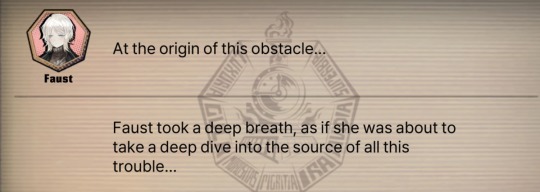

Murder on the WARP Express demonstrates that a good understanding of the games’ themes and of Jungian literary analysis is absolutely essential to figuring out each Sinners’ arc in Limbus. Deciphering, for example, the specifics of Faust’s connection with Gesellschaft is not-so-much valuable as having a strong grasp on what aspects of her character PM is trying to explore. “What is the text communicating? How does it relate to Jung’s ideas? What is the lesson this character is meant to learn?”
That is what matters at the end of the day.
#limbus company#lcb#library of ruina#lor#faust limbus company#faust lcb#project moon#analysis#juyentalks#yikes its almost 4 am#i didnt intend for this to be my first post but whatever lol
274 notes
·
View notes
Text
Hello there.
[Slides elegantly into the tags]
Do you ever think about Emotion?
Of course you do. How could you not. But do you ever think about this exchange specifically:
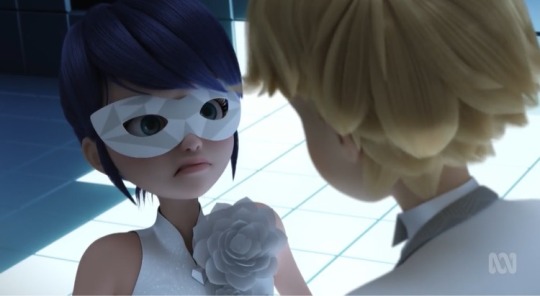
“You’re not Adrien!”
Because Adrien is sweet, and forgiving, and kind. In fact, kindness is his defining quality — Marinette herself made sure of it:
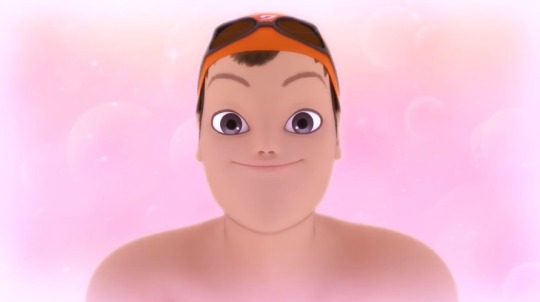
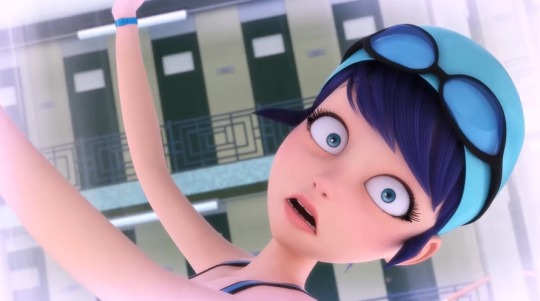
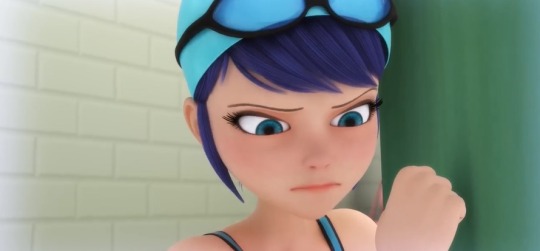
“I’ll never tell another boy I love him before I know everything about him! Whether he’s kind or not, thoughtful, what he does outside of school and with who… I’ll know everything.”
But.
Do you ever think about Adrien’s development in S4 and especially S5?
Overtime, he has grown resentful of a system that exploits him relentlessly.
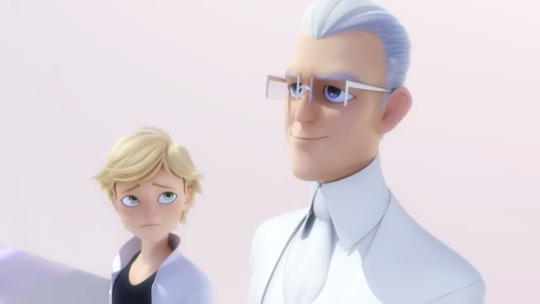
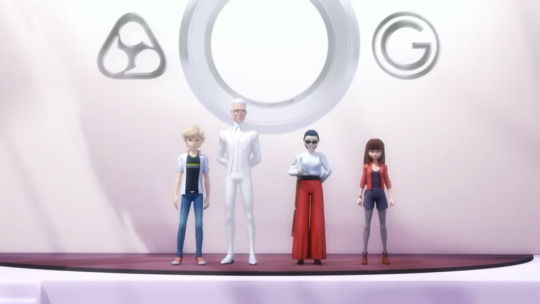
Of the people he gave countless chances to, only to be let down over and over again.
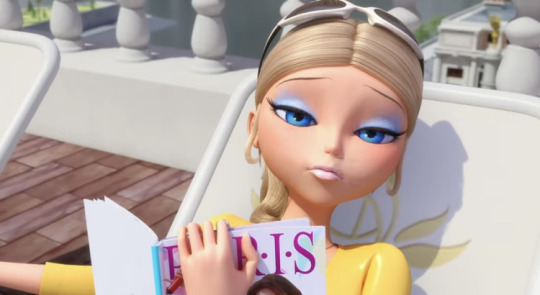
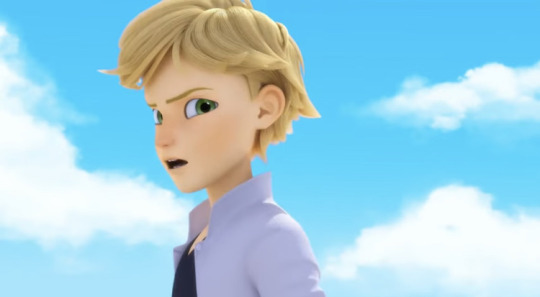
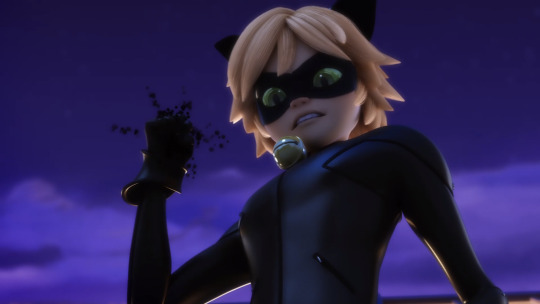
Of the web of lies and half-truths he constantly finds himself tangled into. A web that is only growing bigger, stickier, and trickier to escape.
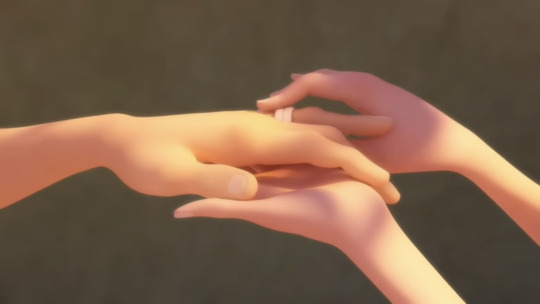
And the Senticousins. Do you ever think about them?
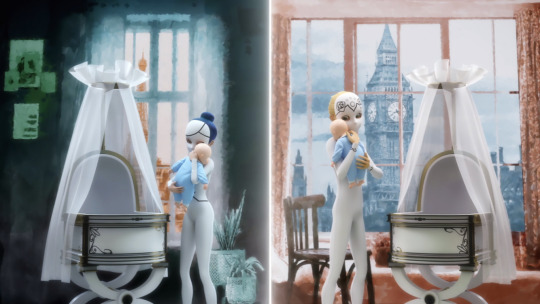
Do you ever think about how they are each other’s reflection, identical and opposites all at once?

“When you bring a living being into this world, you have a responsibility towards them. Your duty is to protect them, love them, help them discover the true meaning of their existence. To deprive them of that… is monstruous.”
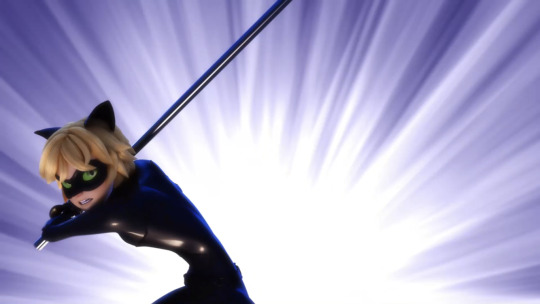
“To have a child is to help them blossom, to grow, to find themselves and to be free!”
Do you ever think about their opposite character arcs in S5 — one learning mercy and trust, the other developing a rage so strong it could destroy the world?
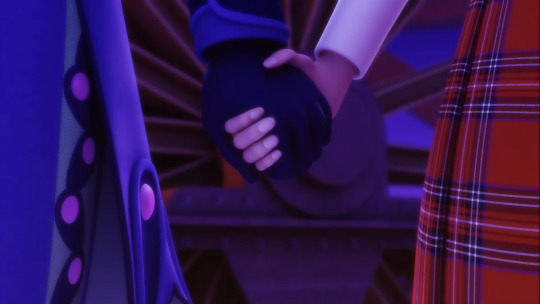
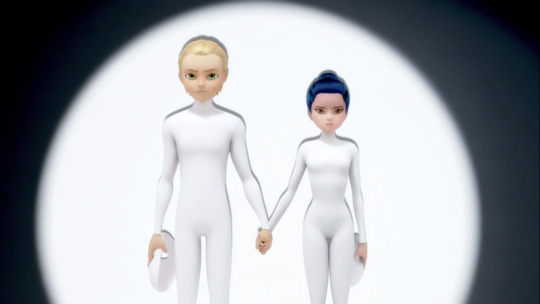
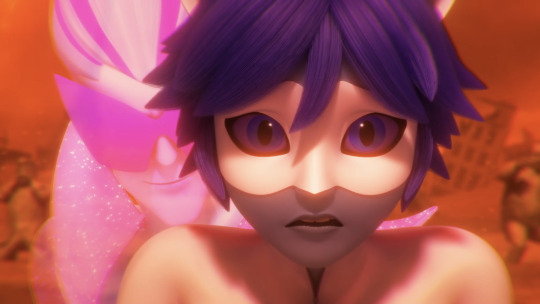
Do you ever think that if Felix can now have this exchange with his mum, and mean it:

“They’re all monsters!”
“Not all of them.”
Then there’s nothing stopping Adrien from saying this:
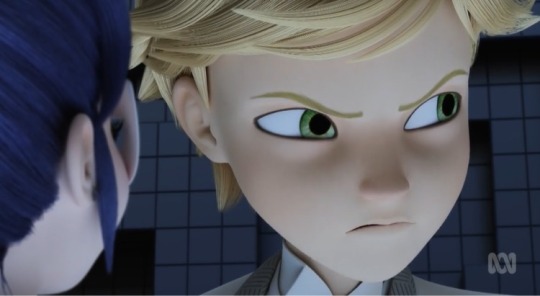
“Look closer, Marinette. They’re the monsters.”
#AND I LOVE HIM FOR IT 💚🐈⬛#To be clear I don’t necessarily think he’d mean it. He probably wouldn’t.#But if he did who could blame him? He has so much to deal with#He’s a child being protected by children and all of them are trapped in this world the adults poisoned for them#Felix and him really aren’t that different. He could be plagued by these feelings too. I have no doubt he’d heal from them down the line#But I would LOVE him to use the world “monster(s)” in S6 (PLEASE NOT AGAINST FELIX THOMAS LOOK AT ME LOOK AT ME THOMAS —)#It would be such a beautiful callback to Emotion and a great illustration of how much his grief is changing him#And how it could take over like it did with Gabriel if he’s not careful. Thank you for coming to my DUUSU Talk#miraculous ladybug#adrien agreste#chat noir#antichat#felix graham de vanily#argos#senticousins#marinette dupain cheng#adrinette#kagami tsurugi#feligami#amelie graham de vanily#mlb spoilers#mlb emotion#random ramblings
625 notes
·
View notes
Text
CARMY NEVER WANTED TO CREATE A MENU WITH SYD.
AND WHY THAT IS THE CORE THEME OF THE SHOW
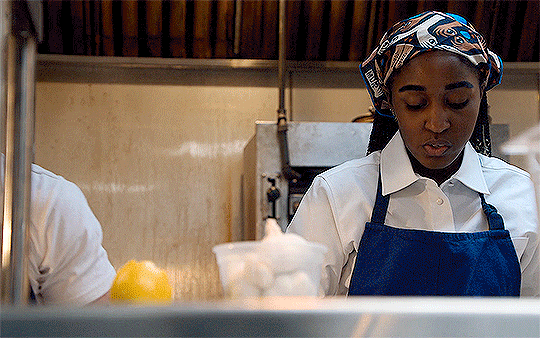
PART 1: THE LIE THAT CARMY BELIEVES
So, one of the bases of creating an efficient character arc is to give the character something they want, and something they need. In the pursuit of getting what they want, the theme of the show and obstacles will show them what they need. Most of the time, they need healing from an emotional wound that prevents them from growing into the ultimate version of themselves, capable of winning the challenges of the story. I will try to explore Carmy's wound and, more importantly, the lie that created that wound.
In 'The negative trait thesaurus" by Angela Ackerman and Becca Puglisi, it reads:
"Wounds are often kept secret from others because embedded within them is the lie-an untruth that the character believes about himself."
When I started therapy (disclaimer: this is not professional advice; I am just talking from how I interpreted all of this), I was introduced to the concept of "limiting beliefs:" lies we have told ourselves about our own nature or the nature of the world. The most difficult beliefs to leave behind are those established in our early childhoods, and we told ourselves those lies to make sense of the world, to make peace with realities we were not equipped to comprehend yet.
Some examples of lies people belive:
"I am too stupid to learn anything; my teacher said so"
"It was my fault that I was molested."
"I am a bad person for wanting a different life."
When people believe these lies, they will act accordingly, maybe attracting situations that hurt them but keeping the lie active in their lives. They may self-sabotage or create bonds with people who also believe the lie, even if it doesn't seem this way.
In some cases, people may develop complete personalities or behaviors to prove the lie wrong, but deep down, they still believe in the lie. Carmy falls into this last category. This is where we find the most contradictory parts of his personality, how he can act shy and insecure in some instances and appear confident and even aggressive in others.
Long post underneath.
THE RESENT OF A MOTHER:
We can only assume here because I think Storer is gonna let us know more about this soon, but I think I got an idea of this wound when I saw the only moment Carmy was alone with Donna on "Fishes."
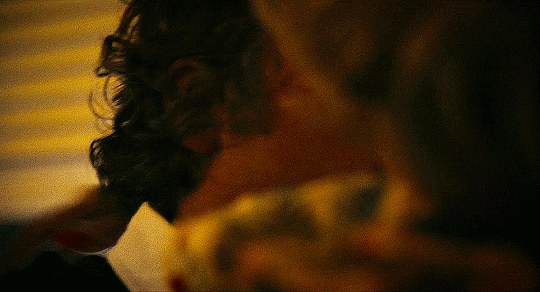
I have a lot of things to say about Donna herself, but let's begin with the obvious: the conversation in this scene had little to do with the dinner itself. This was a woman stating that she felt alone and not valued, probably due to being abandoned by her husband and having to overwork herself at the beef to support her 3 kids, all while being a single mother. We don't know if this feeling of abandonment is something she has carried since childhood, but in the state of current womanhood, it wouldn't be uncommon. The work of women (especially mothers), particularly the emotional labor, is rather invisible and not valued at all.
But again, this is something she has used as fuel to resent her kids, who, at the end of the day, didn't ask to be here. Her anger has to go somewhere since she cannot direct it toward the people that ctually caused it. To get to the point:
THE BEARZATTO SYBLING DYNAMIC
Carmy said, "You are not alone; I am here with you." (This kind of comes back to telling Syd she was not alone at the end of the season.) This scene is about a kid trying to communicate to his mother that he loves her and trying desperately to connect with her, to get her to express her affection for him as well.
It tells me that growing up, he felt like he had to "earn" her affection. Donna likes to make her kids feel guilty about her unhappiness, so the kids feel that they are constantly walking on shells because they think their mother hates them, or at least that she resents them and that it is their responsibility to fix it.
In the scene, Carmy asked,
"What is so hard, Mom?"
I think what he was actually asking is, "What is so hard about being with us, to love us? What did we do to you that made you resent us this way?" He is asking because he wants to know, to finally understand. Why do you drink, Mom? Why do you yell? Why do you say such hurtful things?
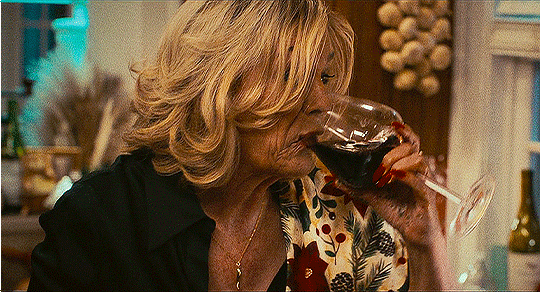
When she answers, "Nobody makes things beautiful for me," you can see in his face the disconnection. He knows he can't do anything about that.
Then, a crucial part in the scene occurs when Donna calls him "Michael, " which indicates that the only one of her children who could make her feel happy was Michael, or at least that is how the other two kids felt. You can see the hurt in Carmy's eyes in the scene because this answer dismisses his effort to connect to his mother in his own right. She asks him to just leave. He offers to wait to connect with her. Then, it comes to the most chilling moment on the scene, the "we have a problem" using his full name, with resentment in every word. She hugs him while crying, kisses him, and then slaps him.
This is rejection. There is a book called "The Five Wounds of the Soul": wich are Rejection, Abandonment, Humiliation, Betrayal, and Injustice. I think Carmy's wound is rejection, for never earning his mother's love, particularly comparing himself to Michael.
Michael took responsibility for the Beef, finally giving their mom a break. It was Michael's job to make sure everyone was having a good time, to compensate for the discomfort that caused being in Donna's presence, to make sure all of them stayed as a family, which was Donna's intention, so Michael thought he had to make that happen for her. Therefore, Michael is the only one of her kids who succeeds and makes her happy. We know Donna rejects Natalie and Carmy. About Natalie, we can write another whole essay.
THE LIE THAT CARMY BELIVES
According to this scene, I think Carmy thinks that her mother didn't love him because he is not Michael; in fact, he is the most "not like Michael" someone could be. He was shy and stuttered and didn't have friends or girlfriends, comparable to Michael's ability to control every room he was in. Carmy was sensible and no macho alfa as Michael presented himself to be. Carmy left home and the family business, and both Michael and Donna expressed that they feel like he thinks he is better than them. Michael admitted later to admiring Carmy's work in Copenhagen, but Donna never did. carmy grew up having to live with the crumbles of Donna's attention that Michael left behind, wondering every day what was so wrong with him that made her reject him, and wondering what he could do to change that.
The lie that Carmy belives, could be sumarize this way:
I need to earn people's love. I need to always go the extra mile, doing the most possible at all times to earn people's love.
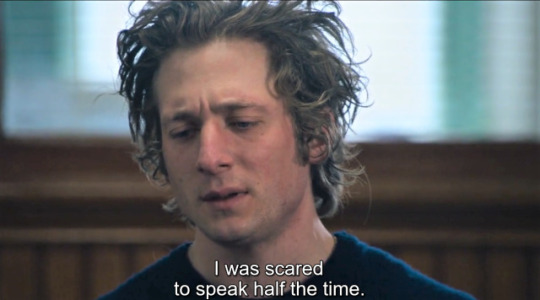
This all goes back to his trauma with Michael. It goes back to his career as a chef and how he became the best. He didn't need to succeed on a larger scale in the culinary industry to earn Michael's respect and love; he needed to be the best in the world, so he did that. He judges his own social abilities, comparing them to Miachae's. He left that promising career only because of Michae's death. He got the girlfriend Michael wanted for him (not saying it was the only reason, but it was there).
PART 2: WHAT DOES ALL OF THIS HAD TO DO WITH SYDNEY?
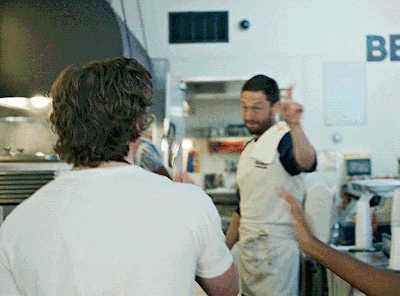
Well, what does a person who feels they always need to do the most? They do the most. I want to bring you back to the moments Carmy had to develop menu ideas with Syd on s1 and s2.
When Syd suggested items for the menu in s1, he gave her an inconclusive, not enthusiastic "maybe."
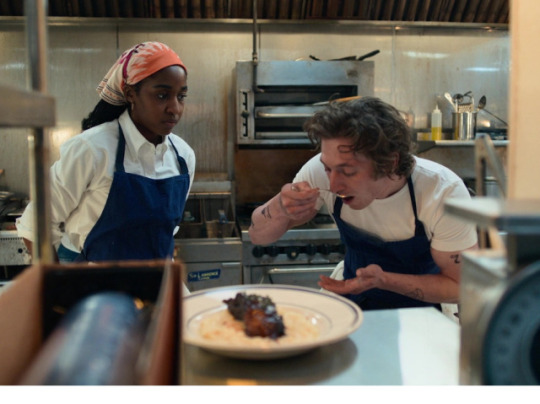
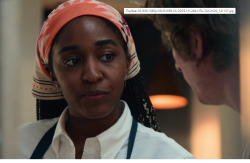
When she had to actually cook the thing for him to approve, he tried to make her feel small about it. He felt the need to remind her that she was "impatient and green," according to her previous bosses. He commented about her possibly ruining the flow by using time to cook her recipe. Yikes all around, but the core here is that he was treating her like an enemy, like competition, while she was trying to save the restaurant with what they had on hand to use the most efficient solution.
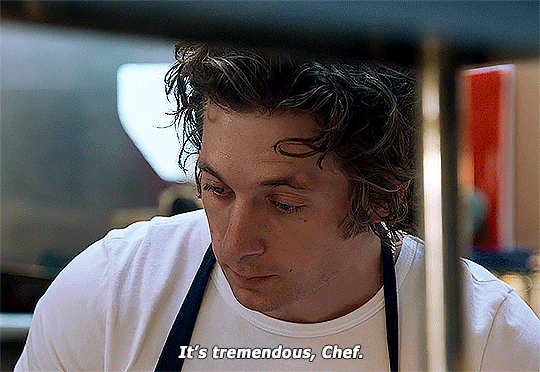
Then, when Carmy tries the dish and feels stunned by it, he has to make an ambiguous excuse on the fly and just finishes every chance of them using the recipe by saying, "is not ready yet"
And what does he do next? He goes to show the crew a recipe that is extremely complicated for the level they are operating at currently—they said so themselves. I think the recipe is a variation of Donna's butter chicken recipe. To put a nail on that coffin of his intentions to earn her love and approval at the end of it all.
But why does he do all this? Because he needs to be the hero, subconsciously, he is still that small kid begging for acceptance and love; he must go the extra mile. He cannot accept Sydney's help and partnership, because that will take away from him earning what he wants on his own merit.
In S2, he seems unenthusiastic about starting the menu in the first place. Then Claire comes along, and he tries to make it work with Syd and the menu, but I think he subconsciously thanks the universe for not having to go to his core wound. That is what self-sabotage is. That is why he bailed on the food tour with Syd, using such a stupid excuse as helping somebody else move out and never mentioning it again. He never asked her what she liked or what ideas she thought of. For most of the creative process, Syd is alone, working on her own creative crisis. The menu ends up being like two recipes they made in collaboration and then all of his family's traditional recipes. It is two of Syd's recipes and the rest of Carmy's. Then, desserts Marcus did on his own. The collaboration was superficial at best.
All of this creates the core theme of the show. The Bear was once a chaotic place (like their childhood home) that needs to evolve into an efficient, peaceful place built on love, support, and mutual collaboration like a functional family should be. Sydney is the member of this found family that forces Carmy to confront his core wound and learn he can actually be good enough while still accepting help. Therapy probably will play an important part in this theme, alongside with Carmy learning there was nothing wrong with him in the first place, that earning your parent's love is not something a kid can do.
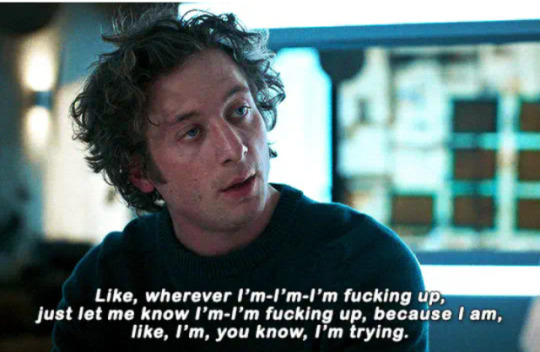
Thankyou for reading. Gif and images are not mine.
#sydcarmy#the bear meta#sydney adamu#carmy berzatto#carmen berzatto#the bear fx#the bear#sydney x carmy#carmy the bear#carmy x sydney#the bear hulu#donna berzatto#michael berzatto#natalie berzatto
310 notes
·
View notes
Text
Devotion 🖤 Masterlist
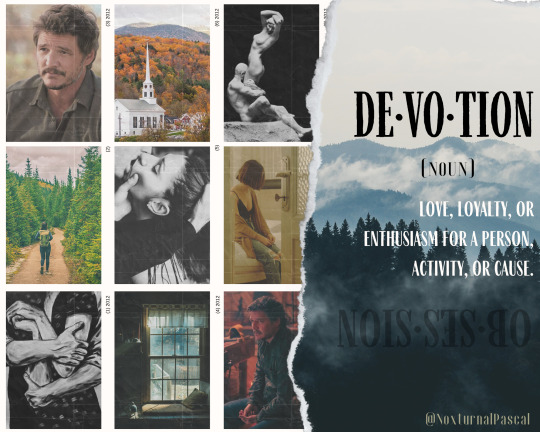
Series Summary: When is it enough? When is it too much? When does Devotion become Obsession?
I. Stronger Together
CH 1
CH 2
CH 3
II. Predator or Prey?
CH 4
CH 5
CH 6
CH 7
CH 8
III. Path to the Future
CH 9
CH 10
CH 11
CH 12
Epilogue
Some Summer Sunday
Series Warnings: 18+ MDNI, canon-typical violence/death, death of clickers, guns, blood/injury, references to previous SAs (not described), Reader has low self worth & trauma, this group/cult is not feminist - women aren’t treated as equals, Joel has sexual relationships with other characters (not described in detail), possessiveness, manipulation, stalking/spying on, Joel gets mean, DubCon Oral, Joel gets abusive (verbally, mentally, physically (he hits, throws, and bites), thoughts of self-harm and suicide, talk of periods & pregnancy, unprotected PiV, oral sex (m & f receiving), come eating, DIRTY TALK, brief reference to breeding kink and creampie kink (but reader does NOT get pregnant in this story).
A/N: OBVIOUSLY this is canon-divergent, but it is post-outbreak. The events of outbreak day have not changed (sorry Sarah). Reader does have a developed background that plays heavily in her character arc, so in that sense she is very much an OC. Reader has a nickname and some minor physical descriptions.
LAYOUT OF JOEL'S HOUSE
AO3 LINK
MOODBOARD BY @strang3lov3
MOODBOARD BY @beefrobeefcal
*🖤*NOTES ABOUT THE CULT & JOEL BELOW*🖤*
ABOUT THE CULT
The Cult's Core Ideology
Build up a community (and supplies) to return to a thriving society that can keep people safe & find a cure.
The Cult Operates by its 3 Tenants:

How Joel does it (what he "preaches")
I. Build Trust (We are Stronger Together)
Makes people feel beautiful, important, HEARD
Shares the wealth (food, shelter, women)
Seeks Power & Control to get others to help him
II. Us vs Them (The Predator Vs The Prey)
FEDRA is the enemy, do not trust them
Assimilate or Destroy all other people/groups
Attack them before they attack you
III. Gather & Prepare (Create a Path to the Future)
You can never have enough, always take take take take
The community you create now will determine future society (fair, honest, hardworking)
Once you are well-prepared and rebuild, you can work on finding a cure
🖤
Notes about Joel and the Cult:
He and Tess began this community together in 2010 after they met Bill and Frank and they felt that the QZ was becoming too dangerous and unstable. They settled in a small, remote town in the mountains of Vermont. Tess helps him "run" the community but she has a submissive role. (Their dynamic here is different from canon.) Tess has his respect probably more than anyone else does but she is not looked upon like an equal by anyone in the community.
Timeline/Ages:
This takes place in the fall of 2012, so It’s been 9 years since outbreak day. Joel is 45, my HC for Reader is Early 30's (Tess is 39/40). Reader's exact age isn't given, but she was in her early 20's on outbreak day and I wanted her to have experienced a fair taste of an adult life before the world ended.
I didn't want to write the reader as inexperienced or with too large of an age-gap, although I think 11-14 years is still pretty significant. She has a history that plays a significant role in her personality (wary, untrusting). She has been hurt/abused by men - both those that took advantage of her when she was young, as well as by those that she trusted/loved.
There are very few physical descriptions but she is very much an OC. Note that her age is not something that's explicitly mentioned because I did want to keep it inclusive. I hope everyone who wants to read this can use their imagination to fit themselves into the story in a meaningful way.🖤
#devotion series#cult leader joel miller#noxturnalpascal#ofc!reader#joel miller#joel miller x reader#joel miller smut#joel miller fanfiction#pedro pascal characters
526 notes
·
View notes
Note
Tips for writing a slowburn romance?
For any writers who enjoy the act of writing romances, we know that feeling of wanting to finally see our characters’ lips meet in that earth-shattering, star-aligning kiss. For some, sparks will fly immediately, but there is something so achingly satisfying about the tantalizing, exquisite torture of a slow-burn romance.
Mastering the slow burn isn’t just about slapping a “delayed gratification” sticker on your plot and calling it a day. It’s about choreographing a love story that unfolds with the grace and tension of a dance, each step building towards a satisfying finale. It’s about kindling a flame with lingering gazes across crowded rooms, accidental brushes of skin that send shivers down spines, and heart-to-hearts that reveal vulnerabilities and forge unbreakable bonds.
What is a slow burn romance?
A slow burn romance is a type of romance plot characterised by a gradual, organic development of feelings between characters. Unlike whirlwind romances or love-at-first-sight scenarios, slow-burn romances allow for a more in-depth exploration of characters’ emotions, insecurities, and personal growth.
This approach often involves a prolonged period of tension and anticipation, where the characters’ attraction simmers beneath the surface before finally coming to a boil. A slow burn romance allows readers to become deeply invested in the characters’ relationship, experiencing every moment of longing, doubt, and eventual realisation alongside them. It’s a delicate balance of push and pull, creating a rich tapestry of emotions that keeps readers eagerly turning pages, desperate to see the culmination of the characters’ romantic arc.
The critical elements of a slow burn romance
Character chemistry
The foundation of any thrilling slow burn romance is the undeniable chemistry between the characters. This doesn’t necessarily mean instant attraction, but rather a spark of connection that grows over time. It’s the way they challenge each other, complement each other’s strengths and weaknesses, and find themselves drawn together despite any obstacles.
A developing relationship
The slow burn romance thrives on the gradual evolution of the characters’ relationship. This development should be organic and believable, with each interaction deepening their connection. This slow progression allows readers to witness the characters falling in love in real time, making the eventual romantic payoff all the more satisfying.
The build-up of romantic tension
Romantic tension is the lifeblood of a slow burn romance. It’s the electric current that runs through every interaction, every shared glance, and every near-miss moment. This tension can be built through lingering touches, heated arguments, moments of vulnerability, situations that force characters into close proximity, and misunderstandings that create emotional distance while deepening desire.
The moment of realisation
In a slow burn romance, the moment when characters finally acknowledge their feelings is pivotal. This realization often comes after a series of events that force them to confront their emotions. This epiphany should feel earned and inevitable, the natural culmination of their journey together.
Popular slow burn romance tropes
Incorporating well-known tropes can help structure your slow burn romance and create familiar patterns that readers enjoy. These tropes provide a framework for building tension and developing the relationship gradually, creating obstacles, internal conflicts, or situations that force characters to confront their growing feelings.
Friends-to-Lovers
In this trope, characters start as friends, and their relationship gradually develops into a romantic one. This allows for a strong foundation of trust and understanding before romantic feelings emerge.
Enemies-to-Lovers
Characters initially dislike or have conflicts with each other, but over time, their feelings transform into love. This creates an exciting dynamic of tension and attraction.
Forbidden Love
Characters face obstacles or societal boundaries that prevent them from being together. This adds an element of conflict and heightens the anticipation of their eventual union.
Second Chance Romance
Characters have a history together, and their paths cross again, giving them a chance to rekindle their feelings. This allows for the exploration of past regrets and personal growth.
Opposites Attract
Characters have contrasting personalities or backgrounds, leading to initial friction but eventually finding common ground. This creates opportunities for character development and compromise.
Workplace Romance
Characters work together and initially keep their feelings hidden due to professional boundaries. This setting provides natural opportunities for interaction and tension.
How to write a slow burn
Now that we’ve explored the key elements of slow burn romance, let’s dive into some specific tips for writing this type of relationship:
1. Establish a strong foundation
Begin by developing well-rounded characters with clear goals, motivations, and flaws. This will make their journey towards love more believable and engaging. Create a backstory for each character that influences their approach to relationships. This history will inform their interactions and provide depth to their emotional journey.
2. Create obstacles
Introduce internal and external obstacles that keep the characters apart. These could be personal fears, misunderstandings, or external circumstances that prevent them from acting on their feelings. These obstacles create tension and conflict, driving the narrative forward while delaying the romantic resolution. Ensure that the barriers feel authentic and not contrived, as readers will quickly lose interest if the obstacles seem forced or unrealistic.
3. Build tension gradually
Layer small moments of intimacy and connection throughout your story. These can be subtle gestures, shared experiences, or meaningful conversations that deepen the characters’ bond. Use these moments to showcase the growing attraction and emotional connection between the characters, even if they’re not yet ready to acknowledge their feelings.
4. Use subtext
Not everything needs to be explicitly stated. Use subtext in dialogue and actions to hint at deeper feelings, allowing readers to read between the lines. This creates a sense of anticipation and allows readers to engage more deeply with the story. Use body language, facial expressions, and internal thoughts to convey unspoken emotions and desires and trust your readers to understand what you’re putting down.
5. Incorporate pivotal moments
Create key scenes that mark significant shifts in the characters’ relationship. These could be moments of vulnerability, shared triumphs, or near-misses that leave both characters (and readers) wanting more. These pivotal moments should intensify the emotional connection and romantic tension between the characters, pushing them closer to acknowledging their feelings.
6. Balance frustration and satisfaction
While the slow burn should create anticipation, be sure to provide moments of satisfaction along the way to keep readers engaged. These could be small victories or tender moments that hint at the potential for a deeper relationship.
7. Develop individual character arcs
Ensure that each character has their own growth arc alongside the developing romance. This personal development adds depth to the story and makes the eventual union more meaningful. As characters overcome their individual challenges, they become more ready for a committed relationship.
8. Use secondary characters wisely
Secondary characters can serve as confidants, obstacles, or catalysts in the developing romance. Use them to provide outside perspectives and to move the plot forward. Friends or family members can offer advice, push the main characters together, or create misunderstandings that add tension to the relationship. Be careful not to let secondary characters overshadow the main romance, but use them strategically to enhance the story.
9. Maintain consistent pacing
While the romance should develop slowly, ensure that the overall story maintains a steady pace. Balance romantic moments with plot developments, character growth, and other story elements to keep readers engaged throughout. Avoid long stretches without any romantic progression, as this can cause readers to lose interest.
10. Deliver a satisfying payoff
After all the buildup, ensure that the eventual coming together of the characters feels earned and satisfying. This doesn’t always mean a happily ever after, especially if you’re not specifically writing within the romance genre, but it should provide emotional resolution for the readers.
#writing tips#writeblr#slow burn#writers of tumblr#writing community#writers#creative writing#writing#creative writers#writing inspiration#writerblr#writing advice#writers on tumblr#writing resources#ask novlr#writing help
184 notes
·
View notes
Text
I think the Duffer Brothers' history with racism in their show goes a lot deeper than a lot of people realize.
Lucas as a character has three distinct B plot stories that get assigned to him: being a minor antagonist to Eleven in season one, being a good friend to the rest of the Party, and being in love with his girlfriend. While Mike's plot is directly centered around two of the most pivotal characters of the show, Dustin is given two different role model characters that shape his arc and is overall the genius that helps the rest of the cast get out of several difficult situations, Will still being connected to the Upside Down after his disappearance in 1983 and that playing into several major plots, Max having a multitude of centric storylines especially in season four and Eleven literally being THE main character- Lucas is only ever given plots that help serve and uplift the other (white) characters. Unless you count him... playing basketball and being friends with Jason. I guess?
Erica is similar to Lucas, but to a much larger degree. I'd like you reading this to think of any single Erica standalone plot in the show that has nothing to do with/does not predominantly or solely benefit the white characters around her. I'll wait.
The Sinclair parents are only touched on in brief sections for the sake of filling the episodes, only ever playing a more major role in Season Four. If you could call it that. I'm sure most of you couldn't even tell me their names off of the top of your heads. (It's Charles and Sue, by the way.)
Argyle was the first somewhat major character of color to be introduced to the show after Erica played her part in season three. I could say similar things about his role in the season overall that I can about Lucas and Erica. Except they set him up to play a bigger role in the next season at the end of season four, going as far as to show him in Hawkins and have Jancy verbally allude to him sticking around, only for the show heads to ghost Eduardo Franco and let him find out he wasn't being brought back through an official social media cast photo.
Kali was a former subject from the same lab El came from, having escaped and subsequently began to lead a vigilante life of enacting revenge on those who played a hand in her suffering. She was the first subject El ever met after leaving the lab, shown to be incredibly powerful and strong-willed. Her and El had an immediate connection, calling themselves sisters right after meeting. But after El was finished with her self-discovery period on the S.S. Kali Gang for one (1) often-forgotten and poorly-written episode, Kali was quite literally abandoned both in spirit and on screen, never to be seen or even mentioned again.
All other characters of color are either killed violently (Patrick), have like ten minutes of screentime total (Jeff and Calvin Powell), or are just straight up background only and may not even have names.
They can dedicate an entire section of season four's plot to Suzie's family, but not to genuine character development for Erica or for Kali to return. They can make room for a whole pointless predatory plot between Billy and Karen, but not to give a more important role to the Sinclair parents. They have room to include a whole plot about El getting bullied in school, but not for Lucas to have a more meaningful story outside of his white friends and girlfriend. They can platform three known white zionists while Palestine currently undergoes a gruesome genocide even as I type this, but they don't have room for Argyle in season five (or even the decency to give Eduardo a fucking phone call).
Not only do the Duffers constantly write themselves into holes because they keep adding unnecessary fodder to the plot, and refuse to kill ANY of their main characters in favor of just creating new characters for the sake of killing them off in mediocre ways despite the fact that they're trying to fit 20+ B plots into 8-9 40-50 minute episodes per season and wondering why half their show doesn't make sense- The time they DO dedicate to character-specific B plots and character arc progression visibly favor the white characters.
If I watch S5, and that's a huge if, I will be sailing the high seas. Between all of this, the fact that they filmed part of season four in an old Nazi prison and tried to turn it into a fucking AirBNB, and the fact that at least four people who play major roles in the show actively support the current genocide of Palestine- I won't be giving them (or Netflix for that matter) another cent of my money.
While you're here, please do your completely free daily click to send aid to Palestine, and here's a list of other resources for how to help more directly.
#♡ · 𝘀𝗵𝘂𝘁 𝘂𝗽 𝗿𝗶𝘃𝗲𝗿#stranger things#free palestine#lucas sinclair#erica sinclair#charles sinclair#sue sinclair#argyle stranger things#kali prasad#patrick mckinney#jeff stranger things#calvin powell#anyway excuse me im gonna go put these characters in an ungodly amount of fics#it's what they deserve
343 notes
·
View notes
Text
Tech Lives: An Ungodly Long Essay
(AKA: Turns out that my Tech Lives compilation post comment was actually a threat.)
There have been hundreds if not thousands of posts since Plan 99 aired wondering if Tech might have made it after his fall - it's probably been brought up more than any other hanging plot point, even after season 2 scooped up Omega and left us on a massive cliffhanger. Now that season 3 has started, though, Omega and Crosshair are home (for now) but we have received an almost aggressive lack of Tech info. So, I've gathered up some of the stronger Evidence for why Tech might be fashionably late but still on his way back from The Void!
THE LEAD UP
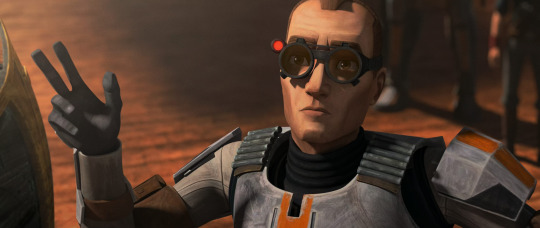
So to start, let's go back to what came before the whole Incident. This will focus mostly on season 2, seeing as that was definitely Tech's season to shine, but with bits about plotlines in season 1. Which brings us to our first bit, that's not really evidence so much as some gentle push-back on a common argument.
Doomed By Character Development?
We've all seen this particular situation before - a character is slated for a tragic death, so just before it happens the writers gives them a little extra relevance to the plot to make sure the audience really feels it when the time comes. The Clone Wars was especially good at this, giving characters like Fives an arc of his own that ended in his tragic death. Season 7 gave us a better look at Jesse, first in the Bad Batch's intro arc and then again through the Siege of Mandalore, all to bring us to the chip activation that led to his ultimate death.
When season 2 started off with one of the two intro episodes spotlighting Tech and our first breather episode of the season also spotlighting him, people started to get worried. So is it fair to say that his spotlight in season 2 was setting him up for a permadeath?
Looking at it, I don't think so, for multiple reasons. For one, Tech didn't just get a spotlight episode, his development dominated a good chunk of the whole damned season, often taking priority over the other characters that wouldn't be dropped into the mists. While giving a little bit of character development to a doomed character can be a good move, giving ALL your development to a doomed character ends up feeling like a good portion of your season was actively pointless.
The Bad Batch is not an open ended show. It seems to have been planned for the three seasons it got, and they would have gone into it knowing they had a set amount of time to work with. Dedicating so much time to developing Tech in preparation for a character death takes away all of their opportunity to develop, well, anything else.
But, along with the amount of time that was dedicated to Tech as a character through season 2, they also didn't develop him in the ways that most often get used for a doomed character. Namely...
That Sure Is A Lot Of Open Plot Lines
And not one of them got tied up. Currently, Tech has two open plot lines to himself, both started in season 2, as well as a key place in the overall show narrative arc. As the overall show narrative arc takes precedence, we'll start with that.
The Bad Batch sets up a few different narrative arcs very early. One is if clones can be more than soldiers - this is the central thing that we see them struggling against from the start, they've been created to be soldiers and don't know much else about how to function in the world. Theoretically this arc can be fulfilled with one or two of them still dying as soldiers, as long as a few of them make it to find a new life for themselves.
The arc that can't be fulfilled without everyone though is the ongoing thread of reuniting the batch. Much of the show is geared towards making the viewer want this specific end result, as soon as they talk about Crosshair, Omega says they'll just have to get him back and complete their family. The end of season 1 teases us with this only to pull it away at the last moment, then season 2 teases us with it again only to yet again pull it away, this time seemingly permanently.
Ending one of your key narrative threads you've been using to draw audiences in only 2/3rds of the way into the show and without ever resolving it... well it would be a choice. If Tech is gone for good then the last time we saw everyone together would be the end of season 1. Rewatches would lack impact because something that was made to seem so vital ended up going nowhere, and the series finale would never quite reach the height that hearing the full batch theme kick in over the team fighting droids together did. It absolutely destroys the central narrative to leave him gone without ever having reunited the family.
And then there's his personal plots.
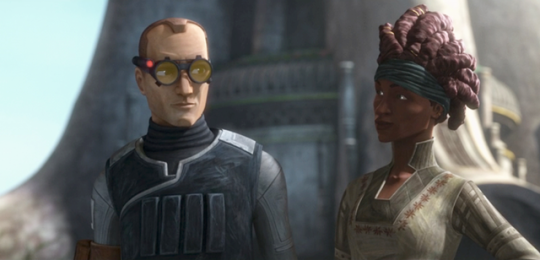
Let's start with the obvious one. Tech got a whole potential love interest this season and they absolutely did not resolve a damn thing about it.
Again, this takes a trope that we all know - the young army man that's going to go home and finally marry his girl, who has his whole life ahead of him, but dies tragically in his final mission - and seemingly intentionally subverts the beats. Because what makes the trope work is that the plot line is resolved as soon as that young man decides how he's going to move forward. He can't die uncertain of if he's going to marry his girl, he has to make a decision, and the longer we spend on the relationship to his girl the stronger the decision has to be to consider the narrative line resolved and free him up for some tragedy.
Tech/Phee is a tentative little 'will they or won't they' romance. They're flirting, they're feeling each other out, they're seeing if they're compatible. To tie up this narrative line we would have to find out if they are or not, get a yes or a no on the question. Will they or won't they? We simply don't know because the writers didn't put a resolution in.
We do get the traditional pre-mission scene with them, which would normally be when we get the first kiss or perhaps the promise of a date, either of which would have had me digging Tech's grave for him to fall into from the second it happened. Or even a 'we can't do this right now, but maybe some day it will be the right time' which would have been a kind of lukewarm resolution but would have at least represented a decision.
Instead we get a scene that almost aggressively refuses to resolve anything. They have an awkward interaction, but not one that says they won't get together, no promises are made for the future, no decision point is reached, and the plot line is still dangling wide open when Tech falls to his supposed death. If we truly leave it off here, well, what was the Tech/Phee subplot for? Why did we spend precious time on it when it could have been spent on something else, if it was meant to make Tech's death hit harder why did it not go further?
A second subplot with Tech is that he certainly made the most progress on seeing options outside of the Empire - it starts early on in Ruins of War when he meets Romar and gets his eyes opened to the idea of cultures that existed unconnected to the war. Serenno existed before the war and before the separatists, and Romar introduces Tech to that idea of an ongoing culture. He gets a taste of racing in front of a cheering crowd, leans further into his teaching of Omega and gets new insights from her regarding their lives as soldiers, his relationship with Phee picks up right when he finds out that she is interested in the preservation of cultures. It's a quiet little subplot, but Tech was seeing the full scope of what the galaxy contained beyond being a soldier in a war.
But, like the Tech/Phee, it never resolves. He never decides to settle down, he never chooses to stop being a soldier or even openly discusses the idea of what life will look like after. Rescuing Crosshair isn't positioned as a final mission that they have to complete in order to give up their lives as soldiers. Without that decision point being reached, the plot stays open, we never find out what he Would Have Done so we don't get a sense of the future that he would lose by dying, which is what the purpose of these types of plots is for a planned permadeath.
The Kaminoans don't create without purpose and writers working on a three season timeline don't typically write without it either. So if we spent the time on Tech/Phee but Tech is dead before it ever went anywhere, if we spent time on Tech's relationship with being something other than a soldier but he never really pursues it, what is the payoff?
Too Much of a Survivor To Die?
There's also the matter of how they chose to build Tech's character this season. Namely they beefed that man's skills up incredibly high making it intensely unbelievable that he's dead without seeing some sort of concrete proof. Things we know about Tech as of the end of season 2 include:
Incredible pain tolerance - Tech fractures his femur in Ruins of War and seems shockingly unbothered by it. The femur is frequently listed as one of the most painful bones to break. This is not a broken toe the man is hobbling around on, he fractured the strongest bone in the body and kept going through the woods. He physically fought and killed a man with that busted femur.
Lightning fast mental processing - this is of course on display nowhere so much as Faster where he's put up against droids and wins by taking calculated risks that no one else is willing to try.
A cool head in stressful circumstances - this one is hilarious because he outright says it, but Tech does demonstrate time and time again that when it comes down to it, he's able to keep calm no matter the circumstances.
Essentially, we spend the entirety of season 2 setting up why Tech is the perfect person to drop out of the sky and have him survive. He has the ability to keep calm and come up with a plan in seconds and he has the grit to keep moving even if he's grievously injured once he hits the ground. When you set a character up like this, you can still kill them, but you have to work harder to do it convincingly. Leaving Tech not at the moment of death but with probably at least a minute to act in and then not showing us the body is the exact opposite.
We have a moment in The Crossing showing us Tech's precise aim, and it comes up again to brutal effect when he shoots out the connection on the rail car. If moments through the season were used to set up that particular instant of the finale, then we can't discount the numerous scenes demonstrating his survival skills as being irrelevant to his chances.
Plus, looking back at Ruins of War - one of the big moments in the episode is towards the end, where Romar tells Tech, "I'm a survivor. Remember?" The camera then lingers on Tech for a long moment. It's not the kind of action that demonstrates his capabilities as above, but it works to associate the words with Tech in the viewers mind. Romar is a survivor, and Tech is a survivor too. And when you intend to kill someone off, it's kind of an odd choice to spend that whole season setting them up as a survivor.
THE FALL
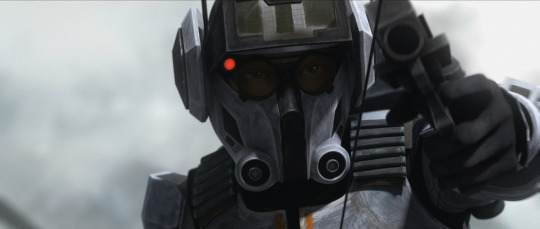
Which brings us to the scene itself. Plan 99, implied to be one of the last ditch plans that they have. It's absolutely a heartbreaking scene, and one that can be tough to analyze when it's so well done, because it's rough to watch repeatedly. But, it's worth doing, because the scene itself is FULL of questions, some structural others more based in the visual presentation.
What is Plan 99?
Well, that's just it, we don't actually know.
We know what it's implied to be, a self sacrifice plan where one of the batch gives their life for the others to get away. But in show it's never actually defined, leaving the full meaning of Plan 99 up to interpretation. It could be as simple as what it's implied to be, but that brings up questions like 'why not provide any lead up or foreshadowing for it?' and 'does killing yourself actually count as a plan?'
Removing the assumptions from it gives us room to speculate. Is the plan actually that they leave him behind, dead or alive? Hunter ordered them to do so without a plan number in season 1, but he is the sergeant, so plan 99 could easily be something that bypasses his authority - if a batcher calls a plan 99, you go and you don't question his decision. It's certainly closer to a plan if there's something they are supposed to be doing from their end rather than just an announcement of intent.
It's not strictly evidence one way or another, but it is something of note when Tech's entire sacrifice is based around a plan that we're not privy to the details of. TBB has hidden its twists in ambiguity before, so it would not be the first time that it let us assume something only to pull the rug out later. But ambiguity is not the only thing that makes this scene stand out in the raising questions department.
Pacing Goes Out The Window
Generally speaking, a self sacrifice is the climax of an episode. Think Kanan, Hardcase, Gregor, Hevy, etc - Even a minor character sacrificing their life tends to make up the most climactic portion of any given episode, let alone one of the characters from the title squad. It gets to be the big central moment, the big rush of music and feeling, the pinnacle of the viewers attention.
Tech's sacrifice is not. It happens around 5 minutes into the episode, is rapidly moved past with barely a moment to think, and then the actual climax is Omega's capture on Ord Mantell. They even repeat the music when Omega is captured, except much stronger this time, making it clear that this is the emotional crux of the episode, this is the scene that is supposed to stick with you.
The opportunity to make it the climax of an episode was certainly there. The storyline could have been adjusted to put Tech's fall at the end of The Summit, allowing more time in Plan 99 for processing his loss and making it feel final. The pacing choice is one that doesn't allow the viewer to process the loss, only giving us maybe a couple minutes of time with actual emotional reactions before we're barreling off to the next plot point. Why was Tech's death de-emphasized within the episode if it is indeed our last moment with this central character?
Tarkin, Eriadu, & Saw Gerrera
A lot goes into the set-up for Plan 99. We have Tarkin's base on Eriadu as the setting they're working within, going up against Tarkin for the first time since early season 1. This is the big leagues, and something that's come up in multiple interviews is that when going into the den of one of the franchise's big bads we have to have consequences, something to demonstrate that Tarkin is not to be trifled with.
Sounds reasonable enough. Except Tarkin doesn't actually do anything in either of these episodes. The thing that actually threw them off was Saw's planning mixing in with their own.
All Tarkin does upon finding out that the batch is stuck on the rail is order an air strike and ignore that this would kill many of his own men. This is certainly evil, but it's standard Imperial evil. Rampart would have given that order. Hemlock would have given that order. The guy in Tipping Point that we know for 5 minutes before he fried himself would have given that order.
So if the point of this finale was to demonstrate Tarkin's power, then bringing Saw in both complicates the plot and devalues what they're claiming they are trying to show. So is the point to get them to Tantiss? No, because they fail in that. They don't plant the tracker, they're no closer to finding Crosshair than they were before.
By all accounts the point of the whole endeavor is in fact just to drop Tech off a sky rail for reasons unknown and injure Omega to force them to go back to Ord Mantell. These two things could have happened anywhere in any way of course, so why choose Eriadu and why choose to complicate the plot by introducing Saw rather than letting Tarkin handle the job?
They're questions we don't have answers to yet, but they're very hard to get answers to if Tech is dead and completely out of the picture. Having a dead body on Eriadu is fairly useless to the plot, having a living Tech on Eriadu though? That has potential to move them huge leaps forward in a very short amount of time once we bring him back in. Especially given his conversation with Saw prior to everything going downhill - Tech was in favor of gathering intel from the facility rather than destroying it.
And what about Saw, anyway? If he was genuinely there to cause problems and fly away, again, that's a plot wrinkle that isn't needed and took time away from everything else. If he's there because they needed someone to pick Tech up though? There's potential there.
Did Tech's Sacrifice Mean Anything?
In universe, Tech's sacrifice means everything, of course. It's a decision made in the moment to risk everything to save his family. It's a noble deed and one he does without hesitation. But pulling away from that narrow scope of an in universe perspective, what did we accomplish narratively with his fall?
Well... not much actually! They got over the bump in the road that they encountered all of five seconds ago and promptly crashed headfirst into another, different bump in the road. Tech's dramatic sacrifice didn't allow them to escape unharmed, it didn't allow them to find Crosshair, it just allowed them to move a few steps forward, after which Omega is almost killed and then captured, which is a fairly weak reason to sacrifice a whole major character.
But not every character death is exclusively about narrative, sometimes it's about the character arc itself. So does this close out anything for Tech's character development? Again, not really. Tech has always been completely loyal to the squad and would have risked anything for his family. He never had a choice not to fall, it was either just him or the whole team, and he is an endlessly logical actor. The action would have played out the same had it happened in the series premier or the season 1 finale, or any other time in the show. If anything it's a backtrack on his character by putting him solidly back into the soldier box that the show is trying to let the clones grow out of.
Maybe it's not about Tech's character though, maybe it's about everyone else's! Does his death change anyone's trajectory? Again... no, not really. We'll get into season 3's lack of mentioning Tech later, but in the immediate aftermath of his fall, no one's course or actions is majorly changed because of his loss. Hunter wants to go back to Pabu where it's safe, the same thing he wanted to do before they ever left for this mission. Omega puts herself in danger to save her brothers, which has been one of her defining traits since season one. Wrecker is following Hunter's lead, same as he always did. (We get very little of what Echo hopes to do, but the opening of season 3 reveals that they went back to work with Rex, exactly like they were doing before.)
So narratively nothing required him to die, the character's arc isn't completed, and the other characters aren't motivated to change. If Tech dies here, it's the picture of a shock value death. It doesn't complete or inform his character, it doesn't need to narratively happen in order to put Omega on the path to being captured, and thematically it exists just to give the viewer an unnecessary gut-punch when just the failure to rescue Crosshair and the loss of Omega would have been enough.
Framing is Everything
In a death scene there's nothing more powerful than our final shot of a character. The very last we'll ever see of them, the image that will linger in our minds when we think of that character from then on. This is especially important in animation where everything has to go through several iterations before deciding on what that final look will be. You want it to be impactful, you want the audience to have one final connection to the character before they're gone for good.
So why does Tech die with his helmet on?
If there's one thing TBB is good at, it's their expression work, and a death scene is a perfect place to show off their full range, which is why most deaths meant to have a heavy impact occur with faces unobscured. Crosshair loses his helmet and takes Mayday's off so we can see both of their faces as Mayday dies, Slip, Cade, even Clone X and Wilco, all die helmetless. Looking into older series you have Kanan dying without his mask, Fives, Hardcase, Waxer all dying helmetless with one last good look at their faces and expressions.
And while Tech's helmet gives us a good look at his eyes, the rest of his face goes unseen, and Wrecker's face as he watches this happen is completely obscured. We're denied a look at a lot of their expressions as the decision is made and Plan 99 is executed, rendering it less personal than it otherwise could have been. Tech could have lost his helmet in the blast that knocked him from the rail, Wrecker could have had his helmet knocked off at some point to give us a good look at his expression. TBB isn't known for pulling its punches, so why leave our final look at Tech's face back in The Summit and not here?
Then there's the framing choices. We get some absolutely amazing shots of Tech during the fall, from taking the shot to falling backwards towards the cloudy cover - but here's where some interesting choices are made. Rather than letting our last shot of him be a face up shot that keeps eye contact with the camera as he falls, they make the choice to have him flip over, and we hold the shot as the rail car goes down after him, partially obscuring him.
Which means instead of our last glimpse of Tech being something like this.

We end up with something closer to this.
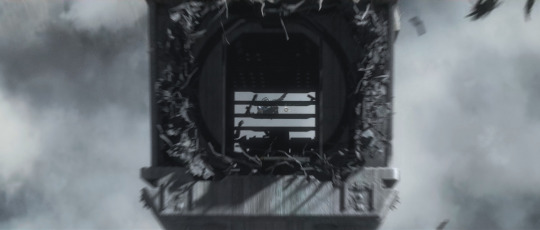
Which, while we all love those Tech crotch shots is somewhat less impactful emotionally. These frames go through multiple departments and get multiple eyes on them before going through final animation, and no one thought that leaving him face up and unobscured until he disappears into the fog would stick more firmly in the viewer's memory?
The Flip Might be Intentional
And I don't just mean out of universe, as every detail of animation is often intentional, but in universe as well. If you look closely at Tech as he falls, he seems to roll his shoulders back in order to begin flipping over. It was a specific enough detail to send me searching for a reason and I found it in instructions on how to survive a long fall - the first thing that you're supposed to do? Get into the arch position like a skydiver to slow and control your fall.
The flip was important enough to not only include but to include the small detail of Tech intentionally flipping himself over into said position. It's not a confirmation but it's an interesting detail, and one that has very few other reasons to exist.
THE AFTERMATH
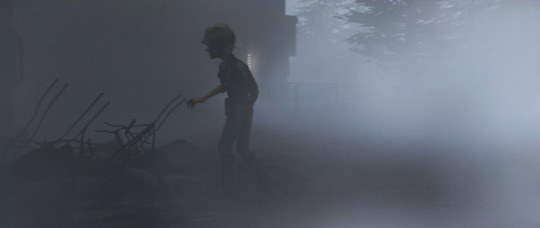
Image chosen because even thinking he's alive I didn't want to pull from Omega reacting to the fall on Ord Mantell. Looking at her makes me Sad. So the fall has happened, the rail car has rushed forward and crashed, and Omega fades in and out of consciousness until finally waking up on Ord Mantell to the bad news.
"What if he's hurt?"
Omega is our POV character for the show. We may sometimes see things she doesn't, but emotionally she remains the center of the narrative, the character that the target audience will see themselves in. Her ultimate thoughts on a situation are the closest we have to a clear indicator of our intended takeaway.
So it's interesting that the first thing we hear out of her, having heard that Tech 'didn't make it,' is a firm denial. He can't be gone, he might be hurt, he needs them and they need to go back for him. And, despite Hunter continuing to talk with her about it for a bit, we never actually hear Omega explicitly take it back or verbally acknowledge Tech as dead. The closest we get is 'lost' which she also uses for Echo in The Crossing.
Now, here's where the interpretation between the adult and child audience will likely differ. From an adult perspective, this is a reasonable reaction for a child her age. It comes off as very natural that she doesn't want to accept it and that she doesn't have time to really process that it's true before the scene moves on. It makes sense from an in universe perspective.
However, the main audience is still children who actually are Omega's age and who are being presented with her as their window into this world. And their takeaway, seeing that same scene, is likely to be that Omega is correct. They don't know that Tech's dead, just because an adult says it doesn't make it true and just because Hemlock says it DEFINITELY doesn't mean it's true, they have to go back and check.
If they wanted the main audience to think that Tech is dead for sure, they could have had Omega be the one to say that he's gone, with Hunter simply confirming it for her. Alternatively, Omega accepting it when Hunter tells her would also function in the same way - ultimately, as the POV character, if Omega doesn't accept it there's a strong possibility much of the audience won't accept it either, especially without other evidence.
No Body?
And, as we all know, we simply don't have other concrete evidence. Not only are the batch given no time to look for Tech's body or any confirmation that he died, but we get a whole scene with Hemlock and the goggles where he also confirms verbally that he doesn't have a body either. There's very little reason to have him say this outside of putting a bug in the viewer's ear that he might not be gone for good.
Not only do we have that verbal confirmation, but we have multiple places where a body could have been included or implied without adding much to the runtime.
Easiest place would probably be when Omega passes out - there's a trooper's corpse right there in front of her, and it would have been very easy to make that identifiable as Tech. Have one of the boys check his pulse like Crosshair did with Mayday and then be forced to leave after confirming he's dead. Would it require a little bit of fudging the details of how he landed so close to them, sure, but it would have been narratively streamlined and easy.
Have Hemlock bring his helmet rather than his goggles (and damage it in a way clearly incompatible with survival) or confirm that he did find a body but has no use for the goggles.
Put the body in Hemlock's lab when Omega is brought there at the end of the episode. Have a sheet covering him even if you want and just one of his hands hanging out, especially the one with the distinctive light on the back of it. Give us her reaction to that.
These are just the ones that don't involve adding scenes or making major changes - instead, in a franchise known for bringing back everyone and their grandmother especially if there's no body, they chose to leave it extremely vague.
Reused Score
The soundtrack for Tech's sacrifice is fantastic, I don't think anyone can argue that. In fact it's so good that it's used occasionally used as a reason for why he's dead for real. If it's a fakeout, why go so hard on the music?
It almost sounds like a reasonable argument, except that the music isn't even unique to Tech's fall. We get the same motif later in the episode with Omega's capture, and it actually comes in even harder and more impactful there than it did with Tech falling.
Reusing bits of the music has two results. It lessens the impact of hearing it with Tech if it is in fact his Death music, because it makes it clear that he is not the central feeling of the episode but rather, Omega's capture is. As mentioned before, deaths are usually the climax of their own episodes partially to avoid them being upstaged by any other plot points, but here Omega's capture is fully prioritized over the loss of one of our central characters.
The second result is that it changes the meaning of the music. It's no longer meant specifically to underscore a tragic death, but rather a more general one of loss and separation. And if it's simply about that separation, then it no longer requires Tech to be dead to have that same impact. They're apart from each other, and that's painful enough.
SEASON 3 SO FAR
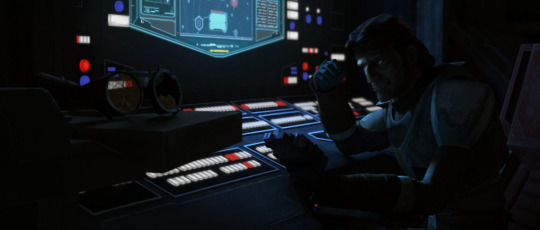
Which of course finally brings us to season 3! We're five episodes in as of the posting of this, so a full 1/3rd of the season down, which gives us a good idea of how they're handling the whole grief aspect of this scenario.
They Aren't!
That's right, we simply have not directly acknowledged or dealt with the whole 'watching your squadmate fall to a presumed horrible death' thing even once in five episodes. Tech has been mentioned by name twice, we've seen his goggles once, and Wrecker makes one sideways reference to him having not made it back.
In universe, there is a several month timeskip and it seems to be implied that the majority of the grief milestones happened in that gap. For example, we don't see Crosshair finding out from Omega, we don't see Omega grieving her brother, we don't see Phee finding out (more on her in a bit) despite her fledgling romance. Months of grieving and processing skipped over and what comes out the other side is single line mentions that go by in seconds.
This is especially apparent after episode 5, where we got something to compare it to. Crosshair has a long, painful moment of grieving with Mayday's helmet when they return to Barton IV. It's deep, personal, and intimate and we take a minute with him gathering up the helmets of Mayday and his men to set them up on the crates the same way that Mayday had honored them.
Mayday is a one episode character that was important to only a single character, Crosshair - Tech is a core member of the team present through two full seasons and shown as close to every member of the squad. Yet the single scene grieving Mayday is longer and more emotionally gripping than every short mention of Tech so far in season 3.
Narrative Grief
Seeing characters grieve their loved ones onscreen is about more than just the characters themselves. It's also part of the viewer experience - through the characters' grief, we're able to process our own grief at the loss. It makes it feel real, it makes it feel personal, and the amount of grieving needs to be proportionate to the character's importance in the story.
This is especially true in a show written for children like The Bad Batch. Kids don't typically have the same experience with death as adults, and a well written main character death within a children's show will need more time and energy spent towards making the loss feel real. We see this with deaths like Kanan's; it wasn't Jedi Night that told the viewer that Kanan was really, truly dead, it was Dume, where the characters mourned him and dealt with the aftermath.
Currently, with Tech, we do see holes in the team that make us miss Tech but they remain completely unaddressed by the characters. We see Tech's goggles, but Hunter isn't looking at them, he's looking at Lula. Omega mentions Tech having taught her all the plans, but without any real sadness on her or Crosshair's part. The closest we get to actually bringing it up are Wrecker saying 'not everyone came back' and Echo mentioning the datapad would be difficult without Tech, and both of those are only seconds long before moving on. They don't serve as any kind of catharsis for the viewer, relying more on gut punch impact and keeping the wound open rather than allowing it to heal. The difference between the treatment of Tech's death and Mayday's just makes it more stark.
How Do You Like Yearning?
Interestingly, though, it strongly resembles the writing team's handling of another situation: Crosshair's departure from the team in season 1 vs Echo's in season 2. The show even drew a lot of flack for the lack of discussion on Crosshair's betrayal, as outside of a couple conversations the matter often went unremarked on. Echo leaving, on the other hand, got a whole episode dedicated to processing the loss immediately after it happened.
So what was the difference? Crosshair's departure is part of a long term plot point. We're supposed to want him back, we're supposed to want the team to talk about him, anything that would ease the tension. The writers on the other hand want that tension to remain until it's time to actually resolve the plot. So we get those slow drips in between bigger encounters, we get opportunities for Crosshair to come home that he doesn't take, and we don't get the catharsis of the team actually talking about any of it. We're left to want and imagine it, using the yearning to keep it on people's minds more than anything.
If Crosshair had been discussed on screen long enough for the characters to actually come to terms with his absence, though, that would have made the plot feel more settled and resolved early on. It might be conversations we want to see, but it doesn't keep the viewer on edge and craving a resolution. Best case scenario we're just not as desperate for Crosshair to come home - worst case scenario we accept that he won't be returning and find the fact that he eventually does to be unrealistic.
Echo on the other hand gets their absence processed immediately, because their absence from the team is not meant to be a huge plot point. It's something the team has to deal with, yes, and the viewer wants to see them again just like Omega does, but Echo returning isn't meant to be a maybe, and it's not supposed to keep the viewer wondering and worrying. It's a when, not an if.
Similarly to Crosshair, Tech has never felt like a resolved plot point. We don't get confirmation on his death, we don't get any long term grieving, and we get drip fed acknowledgements that pry the wound back open. If we actually see the team discuss and come to terms with their grief and loss, the plot point closes, the wound closes and we begin to fully accept a team without Tech in it, which makes it harder to reinsert him into the storyline if he is in fact alive.
If he's truly gone for good, what is the point of denying closure to the audience? We know that they are capable of writing an intense mourning moment that feels completely in character for otherwise emotionally repressed men such as Crosshair, so why not give us that with the team mourning for Tech? A memorial, an intimate moment with the goggles, a short scene of Crosshair finding out about the loss, or anything at all really? Once again it's something that makes sense if he's alive and we're simply not being shown yet, but makes very little sense to not capitalize on if he's dead.
What's to Come
We have ten episodes of season 3 to go, and a lot to cover. Reviews have indicated that Tech is not explicitly brought up in the first eight, so the earliest we could possibly have a survival reveal is in episode 9. Will it actually happen? Maybe, maybe not. Though interestingly episode 9, The Harbinger, is almost exactly one year after Plan 99, just like The Return aired almost one year after The Outpost. Could mean nothing, but they do enjoy their anniversary dates.
One thing we do know for sure is coming up is Phee's inclusion - she's seen in the official trailer, as well as briefly in a recent twitter spot. This is interesting as Phee is, of course, Tech's teased love interest, and her connection to Tech has been emphasized multiple times, including on her Databank entry and the official 'what you need to know about season 3' guide. When she comes onto the scene, it's very likely that more information about Tech will too.
MARKETING, INTERVIEWS, & SOCIAL MEDIA

I wanted to keep this mostly focused on what can be seen within the show itself, but it's impossible to talk about whether or not Tech is alive without pointing to the absolutely bizarre messaging from the cast and crew, as well as the marketing choices surrounding his sacrifice. (Example: the Instagram Mourning Filter they layered over him in the official trailer, as seen above) I won't get quite as detailed here as in the above, but it does have to be mentioned.
Constant Focus
In between the end of season 2 and the posting of the season 3 trailer in late January, there were several posts on various official Star Wars media. The majority of them were about Tech and Plan 99. In fact, I don't think I ever saw anything mentioning the giant 'Omega's been captured' cliffhanger, just Tech. Over and over again.
Once a character is dead, marketing generally stops caring about them. They're forward focused after all, they want you coming back for what's to come not lingering on what won't be relevant again. So why the constant focus on Tech?
And it wasn't just the social media either - a huge portion of the trailers and reels included old footage of him too. For the most part this was from Plan 99 and bringing up his fall again to rip open those old wounds, but in one case they included action footage from The Summit. This was an interesting case, because the majority of people watching wouldn't have recognized it immediately. Fittingly, the entire comment section was full of nothing but 'Was that Tech?' style comments, which they would have known was going to be the case to start with.
So why are we so focused on a man that's supposedly dead? If he's genuinely never going to show up again why keep putting him in? Everything? While not even bringing him up all that often in the show? If he's dead, this is a truly bizarre marketing decision.
Never Say Die
In interviews or in official material. For several months the word 'dead' was never used for Tech anywhere, not in interviews, not in official material, nowhere. It took until January 23rd for all of the databank entries to be updated, and among all of the main cast he's only referred to as 'killed' once, and it's on Hunter's page not even his own. Then, the Friday before the premier, an interview came out referring to him as dead - on the part of the interviewer, not the creators themselves.
Everything else seems to use a variety of euphemisms. His sacrifice, his absence, his loss, he 'plummeted out of sight', he 'fell from a tram car', he did absolutely anything it's possible to do except outright die apparently.
It's an odd choice when there's known controversy over if he's dead or not. The standard operating protocol of course, in a planned comeback, is to refer to them as dead anyway and allow fandom to fuel its own speculation, but with a fandom as devastated as TBB's was, it's quite possible that the odd behavior had to be introduced just to keep speculation going. The only interviews that sound remotely final came out right before the episodes started coming out - if they had done that from the beginning, the chances of people outright refusing to come back to the show likely would have been higher.
Much like the marketing, this is not necessarily proof of anything - but in combination with the multiple odd things in the show itself, it's certainly suspicious. Speaking of suspicious...
What an Odd Thing to Say
The cast and crew themselves have not been skimping on making strange comments when it comes to the Tech situation.
There is of course the well known Joel Aron (lighting director for the series) tweet that came out the day of the Celebrations panel (AKA when the Tech trauma was at an all time high) and in direct reply to a fan that was having a hard time with Tech's death. It's hard to take it as anything but a reference to Tech given the timing, and it was certainly taken as being about Tech in the quote tweets. If it's not about Tech, why tease the fandom with it? And the specification for it being a mid s3 episode as well...
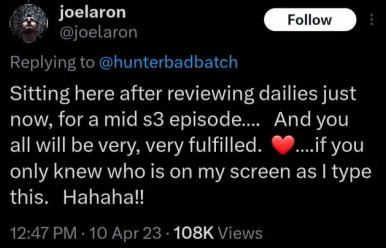
Also from the day of Celebrations, and from the panel itself, we have Michelle Ang saying in front of God and everybody, that Tech "doesn't come back... in this episode, at least." At the time there was a possibility she didn't know and was just leaving it open, but with that only being ten months ago and the extremely long timeframe of animation, it's almost certain that she would have been done with all primary recording by that point. If you know he's not coming back, how do you accidentally imply that he is with no one correcting it?
Dee Bradley Baker, when asked for a farewell message from Tech at a con, came out with "the life of a soldier is fulfilled by fulfilling his mission and supporting his brothers. And this was the end of mine. And that's a good thing." Which was a perfectly serviceable goodbye right up until he said that the end of Tech's (life? soldier's life? mission?) was a good thing.
During an instagram interview we have Deana Kiner, one of the composers, in response to the interviewer talking about the final episode containing a major loss, saying, "It's kind of a loss... It's complicated." The claim on twitter was that this was about Omega, because everyone knows that when someone mentions the major loss in Plan 99 they're definitely talking about Omega.
So is Tech alive? Is Tech dead? We still don't know. But while one or two of the above might be a coincidence, having all of them at once coalesce around this single character death is a lot to chew over. The Bad Batch team has shown willingness to address grief and loss prior, as well as a willingness to show us death onscreen and front and center. So why, with such an important character, sidestep it all in order to keep it vague? Why keep it from sounding final for so long, if the intent the entire time was for him to be dead for good?
We won't know until he either shows back up or the show ends. If Tech's alive, all of the above starts to make sense. If he's dead... well a lot of things will just never quite add up. I feel that this team has shown enough willingness to follow up on their trailing plotlines that they've earned my trust. Fingers crossed for a satisfying resolution for all of us, and for our boy Tech, whatever that resolution may be.
#the bad batch#tbb#tbb tech#the bad batch spoilers#tbb spoilers#the bad batch speculation#this thing is some 7500 words i might have an obsession problem
285 notes
·
View notes
Note
Could you please disprove the whole "jedi and their egos which lead to their down fall blah blah blah" Cus the jedi have never been egotistical to me 😭
Hey there!
So I kinda touched on this subject before, so for more details and quotes, I'll just redirect you to those posts.
Firstly... yes, to a degree, the Jedi were arrogant. They got complacent in a time of peace and were thus completely unprepared to face the Sith, who spent a millenia preparing themselves in secret.
But firstly, when people say "even Yoda says they were arrogant" they completely misunderstand what he was saying (he wasn't lamenting the downfall of the Jedi as an Order, he was subtextually telling Obi-Wan that he can be arrogant too and should cut Anakin some slack).
And secondly... there's arrogance and there's arrogance.
There's "not being ready because you didn't know a threat was looming",
and there's "being a cocky asshole who's swinging his lightsaber in a helicopter motion and saying "come get me shit lords, I've got your dark side riiiight here!""
The Jedi were the former.
To use a metaphor: they're not asleep at the wheel, they're just driving through an unexpected fog.
In fact, after Qui-Gon died, the Jedi did keep an eye out for the Sith Lord, but the Dark Side had clouded everything, by then and to use another metaphor: it's impossible to find a specific black object in a dark room at night.
So when you bear all this in mind, describing the Jedi as "egotistical" and "holier than thou" is actually an uncharitable way to define a group of characters doing their best to catch up and save the galaxy from doom.
Why is that the predominant interpretation? My guess:
Because "good guy" characters now get labeled as "goody-two-shoes" in favor of non-conformist anti-hero archetypes. In fact, due to our history, we're now used to being weirded out and suspicious of characters that label themselves as "genuinely nice".
Because the protagonist of the Prequels is a guy who's flawed, and by comparison to him, less developed characters who have already undergone their character arc (and thus conquered their flaws) won't feel as relatable to an audience as the more imperfect character.
They weren't egotistical. They were simply written in a way that a big chunk of the audience found unlikeable, and to cope they came up with a headcanon that the narrative meant to frame them as egotistical... when really, it wasn't even about the Jedi.
Hope this clarifies some stuff!
92 notes
·
View notes
Text
Something I absolutely love about the alternate-timeline aspect of Scott Pilgrim Takes Off is that it really feels like a logical extrapolation and ‘next-step’ to the genre/trope-subversion and exploration of the original comic.
Remember how the whole idea of Scott Pilgrim the comic is taking a very basic, generic and ‘tropey’ premise; ‘Boy likes girl, boy must defeat girl’s seven evil exes in order to date her’, and uses it as the backdrop and framework to explore, deconstruct and develop its characters.
Like how the biggest conflict at any given point of the comic is never the actual battles with any of the Seven Evil Exes, but rather Scott being forced to confront some major problem with himself or his relationship with Ramona (usually the former). How the true ultimate ‘antagonist’ for both Scott and Ramona isn’t any of the Evil Exes, but rather themselves. Their own long-festering hang-ups and insecurities that they’ve been refusing to confront or acknowledge that have in turn led to them being pretty shitty people over the course of their lives. For as bad as Gideon is, he’s still only a mirror showing all the bad that SCOTT could become.
So with that in mind, it really feels like the anime simply took this idea a step further: What if we took the basic, generic and tropey premise that nonetheless served as the framework for the story and held it together… and broke it.
When the narrative guide and scaffolding that held the original story on a certain course is shattered when the story is just getting started, where does the story go?
It’s actually one of the ways I think Scott Pilgrim Takes Off can be appreciated even if you haven’t read the comic or watched the movie. Even if you aren’t familiar with the story, the first episode makes it pretty easy to guess how this story should play out: Scott meets Ramona, they have their first date, they really hit it off and seem set to become a couple. We’re introduced to what clearly seems to be our ‘Big Bad’ in Gideon and our ‘Starter Villain’ in Matthew. Again, even if you don’t know one thing about Scott Pilgrim, by the time Matthew Patel crashes the party you probably have a pretty good idea how this whole story SHOULD go.
And then Matthew (seemingly) KILLS SCOTT in their first fight!
THEN the second episode ratchets things up even further when all signs point to Scott, our title character, being ACTUALLY DEAD for real. And then Matthew, again the guy who should be the starter villain, goes and beats Gideon Graves, the guy who clearly SHOULD have been the FINAL BOSS of this story!
And then the third episode sees Ramona, the girl previously set-up as the designated love-interest, firmly established as the new PROTAGONIST of the story. With Ramona given both an overarching goal in finding what really happened to Scott, and an ongoing character-arc of meeting and reconciling with each of her ‘evil exes’.
Basically, even if you aren’t familiar with the full specifics of the source material, I feel like Scott Pilgrim Takes Off can still be enjoyed as essentially a show that at first sets up what seems to be a fairly wrote and predictable story before flying COMPLETELY off the rails at the end of its first episode into something quite a bit more unique.
#scott pilgrim#scott pilgrim takes off#spto#scott pilgrim ramblings#ramona flowers#matthew patel#gideon graves#rambling about genre subversion
309 notes
·
View notes
Text
I’ve been thinking lately about how much the ‘curse of Ymir’ really does affect the psyche of each of the nine shifters and how it impacts the ending of the story.
Up until the end of Season 3/Chapter 87-88, the reader and the viewer have no idea that the shifters have a limited amount of time to live. They seem to possess this god-like power and they can rejuvenate and survive almost any injury. They seem unstoppable.
This is what motivates Erwin to create a plan to take one of the nine shifter powers with the serum- having another Titan in your arsenal would make a difference in winning the war.
But what the Paradisians don’t know is how holding the power of the Nine just perpetuates a cycle of violence and cruelty. It’s a curse as much as it is a power. No matter how brilliant or grand your scope is for what you can do with this near limitless power, you have to contend with the fact that you will only have thirteen years to do it.
This revelation to me is the what colors the entire last arc of the story leading into and after the time skip.
For Zeke, it amps up the level of desperation he has for accomplishing the euthanization plan- relying on Eren was still a variable that was largely unpredictable, and he trusted him more than he probably would have if he weren’t running out of time.
Going back further in the story, it retroactively explains why Ymir (of the cadet corps) would go back with Reiner and Bertholdt at all- a seemingly nonsensical choice when it seems she has something to live for in her relationship with Krista/Historia. But Ymir knows she has little time left. She has no future. So she chooses to surrender.
For Annie, it shows her desperation to get back to her father, a man who showed her very little affection, and yet if she could just make it back maybe she could live at least a year or two with him and make at least one happy memory with the man who raised her to kill.
Armin, I honestly feel the most for, because what he and everyone else thought of as his salvation, was actually just saddling him with a curse. And heaps of responsibility to try and be grateful for it. He went from a character with a singular and wholesome conviction, to someone wracked with guilt and forced to solve the world’s problems with limited time and resources.
In Reiner’s case, I actually think the fact that he knows he is going to die is the only thing actually keeping him alive in the tail end of the story. He wants so badly to face retribution for his deeds, and he can only find the strength to keep towing the line because he knows his violent demise is guaranteed.
Characters like Pieck and Bertholdt seem to accept their lot in life- but deal with this internally and develop their own sense of morals despite it- albeit in different ways and in Pieck’s case with a shade of pessimism. Falco and Marcel stand out as a characters who see the farce for what it is- but still want to subject themselves to it in order to prevent someone they love from suffering through it in their place.
Eren, though, it’s easy to see how discovering he has already lived more of his life in powerless ignorance than what he has left is what ultimately causes the collapse in his character. Combine that with the way that he sees ‘future memories’ and doesn’t see any future beyond his own, and suddenly you have a naturally impulsive and violent person living in the most fatalistic reality ever. It makes perfect sense that his fall from grace is near immediate and precipitous.
What difference does all that power make if all it means is that you become a tool for destruction with no future? That you will be forced to curse someone else so that this cruel power will continue to exist? That is the true legacy of Ymir and the Eldian Empire- you can have near limitless power, but you will never have true control over your own life.
And it makes for such interesting discussions and questions about power and mortality and agency- and all the seemingly ‘correct’ and ‘incorrect’ ways to respond to their dilemma.
Anyway, it is always ‘thinking about the moral quandary of the titan shifters’ hours around here…
#aot meta#character analysis#titan shifter#attack on titan#zeke yeager#bertholdt hoover#annie leonhart#armin arlert#ymir#pieck finger#falco grice#marcel galliard#eren yeager#reiner braun
194 notes
·
View notes
Text
obviously there are a bunch of issues with the MCU and I'm not gonna sit here and try to convince everyone that MCU movies are cinema or whatever so don't get what I'm gonna say twisted. I do find their kinda mainstay in cultural media and the dominance they had to be interesting, especially now in an era where the MCU is undeniably falling off and struggling. just as like a cultural analysis I find that interesting and everyone has their opinions of why it happened.
my opinion/theory on why the MCU just crashed is because they sort of forgot what it means to be telling a comic book story, especially a marvel comic book story. Because I've read thousands of issues of various marvel series at this point, across tons of different eras and events, and the thing that makes them last (which is also a thing that drives me personally crazy and I hate so much) is that the status quo doesn't really change. Or when it does, it lasts for a few arcs or years at most and then gets reverted back to the norm eventually. Like the fact that everything is pointless and nothing is a risk is something I loathe, but it is admittedly what keeps them going. If someone just got into comics, they can pick up a modern issue and expect to find Spider-man or Captain America or whoever. They may be introduced to new characters, but the big ones will show up eventually.
And after the last Avengers movie, like half of the mainstay cast are just gone. Which as someone who likes good stories, I think is a good opportunity (which is arguably being wasted but idk I haven't watched any MCU thing in years) to actually shake things up and develop characters that mainstream people are less familiar with and give them a chance to shine and tell interesting stories. But that's not why people like marvel comics.
People like marvel comics because if they want to read about Iron Man, they can pick up any random issue about Iron Man and it will most likely be the Iron Man they know. People like the status quo, and Marvel has never been high literature and has always basically been pulp storytelling, and it gave people status quo and familiarity. And I think Marvel Studios figured this out waaayyy too late.
Because if Marvel actually understood what people like about the comics, they would have embraced recasting major roles from the start. They wouldn't have tied characters' identities so strongly to their actors and would have made it clear that characters can and will continue on with different faces. There is no reason why Tony Stark needs to be RDJ or Steve Rogers needs to be Chris Evans. They would have had plans to not write these characters out of existance the second actors wanted to exit or died or were fired or any of the various reason why actors are no longer involved with the MCU. Hell they had precedent. They didn't have a problem replacing Terrence Howard with Don Cheadle, who are very different looking people who give very different performances, but we know why they felt ok with that recasting but won't recast any of their boys named Chris...
Anyway it seems like they realized that general audiences don't actually like change if its permanent and are learning the wrong lessons with the Doom casting nonsense and the fact that they seem to keep changing what the new story is to fit what they think audiences want.
I'm fine with the MCU dying off and its probably better for media that it does, but again I'm just kinda interested in the fumble from like an objective standpoint because it seemed like they just locked themselves into eventual failure in such a stupid way. Like they could have told the same safe representative Avengers storylines for decades and wouldn't have a meltdown every time an actor in a major role needed to be removed from production if they just accepted that people would be recast as needed. It would be worse for actors and it would be worse for movies in general probably, but it would have kept the MCU churning out pulp like the comics do to this day. But now people are realizing its not just pulp but pulp they don't want and its gonna kill the MCU eventually.
91 notes
·
View notes